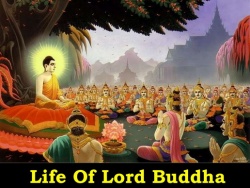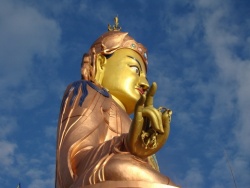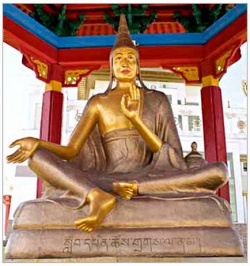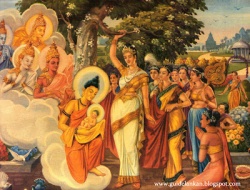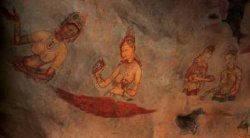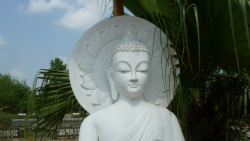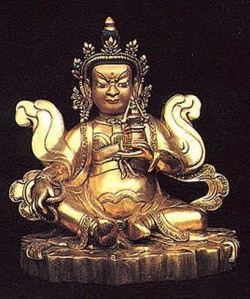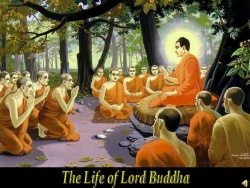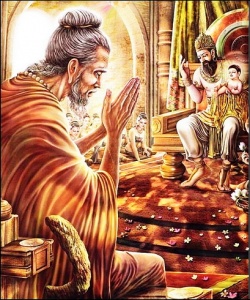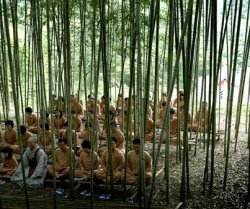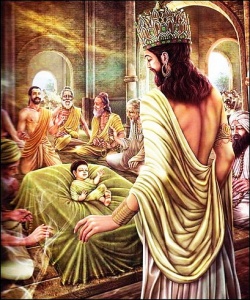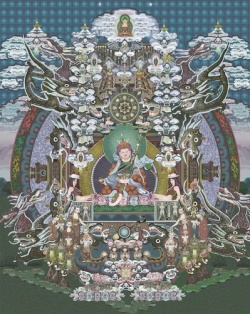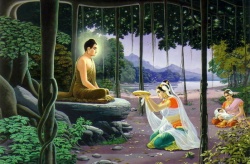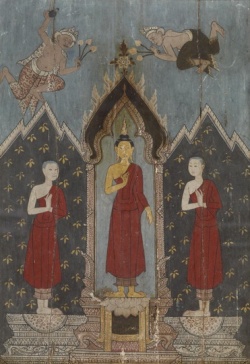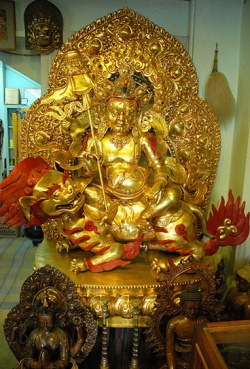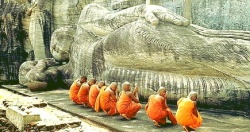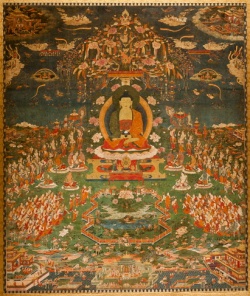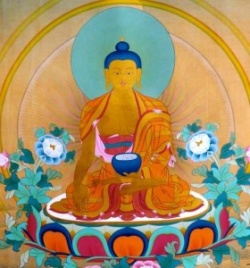Difference between revisions of "Chapter 2 Completed: The Teaching on the Lifespan of the Tathāgata"
(Created page with "thumb|250px| <poem> Then, at that time, at that moment, in the great city of Rajagriha, the bodhisattva mahāsattva known as Ruchiraketu, one who ha...") |
m (Text replacement - "]]]" to "]])") |
||
| (2 intermediate revisions by one other user not shown) | |||
| Line 1: | Line 1: | ||
[[File:Slide-1-1024.jpg|thumb|250px|]] | [[File:Slide-1-1024.jpg|thumb|250px|]] | ||
<poem> | <poem> | ||
| − | Then, at that time, at that moment, in the great city of Rajagriha, the bodhisattva mahāsattva known as Ruchiraketu, one who had performed altruistic deeds under previous Victors and had generated roots of virtue and rendered service to hundreds of thousands of millions of billions of Buddhas, was resting. He thought: | + | Then, at that time, at that [[moment]], in the great city of [[Rajagriha]], the [[bodhisattva]] [[mahāsattva]] known as [[Ruchiraketu]], one who had performed {{Wiki|altruistic}} [[deeds]] under previous Victors and had generated [[roots]] of [[virtue]] and rendered service to hundreds of thousands of millions of billions of [[Buddhas]], was resting. He [[thought]]: |
| − | “By what cause and what condition does the Bhagavan Shakyamuni thus live for eighty years? That is a short lifespan.” | + | “By what [[cause]] and what [[condition]] does the [[Bhagavan]] [[Shakyamuni]] thus live for eighty years? That is a short [[lifespan]].” |
| − | Thinking thus, again he thought: | + | [[Thinking]] thus, again he [[thought]]: |
| − | “The Bhagavan himself has said, ‘Through two causes and conditions does one attain long life. What are those two? There are, namely, giving up killing and giving food intensively.’ He has taught thus. As for the Bhagavan Shakyamuni, for many incalculable hundreds of thousands of millions of billions of eons, he, giving up taking life, perfectly undertook and stayed along the path of the ten virtuous karmas. Food as well as outer and inner material things he completely gave up to sentient beings. Since, in particular, he satisfied hungry sentient beings with the flesh of his own body, blood, bones, and legs as well, there is no need to speak of him doing so with other food.” | + | “The [[Bhagavan]] himself has said, ‘Through two [[causes and conditions]] does one attain long [[life]]. What are those two? There are, namely, giving up {{Wiki|killing}} and giving [[food]] intensively.’ He has [[taught]] thus. As for the [[Bhagavan]] [[Shakyamuni]], for many [[incalculable]] hundreds of thousands of millions of billions of [[eons]], he, giving up taking [[life]], perfectly undertook and stayed along the [[path]] of the ten [[virtuous]] [[karmas]]. [[Food]] as well as outer and inner material things he completely gave up to [[sentient beings]]. Since, in particular, he satisfied hungry [[sentient beings]] with the flesh of his [[own]] [[body]], {{Wiki|blood}}, [[bones]], and {{Wiki|legs}} as well, there is no need to speak of him doing so with other [[food]].” |
[[File:SIGIRIYA 1.JPG|thumb|250px|]] | [[File:SIGIRIYA 1.JPG|thumb|250px|]] | ||
| − | He thought thus. Then, as that sublime individual was entertaining those kinds of thoughts in regards to the Buddha in that way, turning them over in his mind, his house became broad and vast, made out of blue vaidurya, and adorned with many divine jewels; the Tathāgata had changed its color, and filled it with incense surpassing that made by the gods. In the four directions of that house, four thrones of divine jewels arose, and from those thrones as well, mats of divine cloths and fabric encrusted with tiny jewels arose. They were adorned by many divine lotus flowers and jewels which also arose from those thrones. There arose colors transformed by the Tathāgata. | + | He [[thought]] thus. Then, as that [[sublime]] {{Wiki|individual}} was entertaining those kinds of [[thoughts]] in regards to the [[Buddha]] in that way, turning them over in his [[mind]], his house became broad and vast, made out of blue [[vaidurya]], and adorned with many [[divine]] [[jewels]]; the [[Tathāgata]] had changed its {{Wiki|color}}, and filled it with [[incense]] surpassing that made by the [[gods]]. In the [[four directions]] of that house, four thrones of [[divine]] [[jewels]] arose, and from those thrones as well, mats of [[divine]] cloths and fabric encrusted with tiny [[jewels]] arose. They were adorned by many [[divine]] [[lotus flowers]] and [[jewels]] which also arose from those thrones. There arose colors [[transformed]] by the [[Tathāgata]]. |
| − | From those lotuses as well, there arose four Buddhas, Transcendent and Accomplished Conquerors. In the eastern direction arose the Tathāgata, the One Gone to Suchness Akshobhya. In the southern direction arose the Tathāgata, the One Gone to Suchness Ratnashikhin. In the western direction arose the Tathāgata, the One Gone to Suchness Amitayus. In the northern direction arose the Tathāgata, the One Gone to Suchness Dundhubisvara. As soon as those Buddha Bhagavans arose on those lion-thrones, then, at that time, the great city of Rajagriha was pervaded by great illumination. The entire universe of three-thousand million world-systems, and, in all the ten directions, world-systems of the universe as many as there are grains of sand in the river Ganges were filled with great radiance. A rain of divine flowers also fell. The sound of divine cymbals also issued forth. | + | From those [[lotuses]] as well, there arose four [[Buddhas]], [[Transcendent]] and Accomplished Conquerors. In the eastern [[direction]] arose the [[Tathāgata]], the One Gone to [[Suchness]] [[Akshobhya]]. In the southern [[direction]] arose the [[Tathāgata]], the One Gone to [[Suchness]] [[Ratnashikhin]]. In the [[western]] [[direction]] arose the [[Tathāgata]], the One Gone to [[Suchness]] [[Amitayus]]. In the northern [[direction]] arose the [[Tathāgata]], the One Gone to [[Suchness]] [[Dundhubisvara]]. As soon as those [[Buddha]] [[Bhagavans]] arose on those lion-thrones, then, at that time, the great city of [[Rajagriha]] was pervaded by great [[illumination]]. The entire [[universe]] of three-thousand million [[world-systems]], and, in all the [[ten directions]], [[world-systems]] of the [[universe]] as many as there are grains of sand in the [[river]] [[Ganges]] were filled with great radiance. A [[rain]] of [[divine]] [[flowers]] also fell. The [[sound]] of [[divine]] [[cymbals]] also issued forth. |
[[File:65.jpg|thumb|250px|]] | [[File:65.jpg|thumb|250px|]] | ||
| − | Through the power of the Buddha, in this universe of three-thousand million world-systems, all sentient beings without exception were imbued with divine bliss. Sentient beings whose senses were incomplete were endowed with all their senses. Sentient beings that were blind saw forms with their eyes. Sentient beings that were deaf came to hear sounds with their ears. Sentient beings that were crazy found their own mindfulness. Sentient beings that were intensely distracted became intensely undistracted. Sentient beings that were naked were clothed with garments. Sentient beings that were hungry had their bellies filled. Sentient beings that were thirsty came upon drinks. Sentient beings that were afflicted with illness were freed from sickness. Sentient beings whose senses were defective had their senses made intact. In this universe, incredible, miraculous phenomena occurred on a massive scale. | + | Through the power of the [[Buddha]], in this [[universe]] of three-thousand million [[world-systems]], all [[sentient beings]] without exception were imbued with [[divine]] [[bliss]]. [[Sentient beings]] whose [[senses]] were incomplete were endowed with all their [[senses]]. [[Sentient beings]] that were [[blind]] saw [[forms]] with their [[eyes]]. [[Sentient beings]] that were [[deaf]] came to hear {{Wiki|sounds}} with their [[ears]]. [[Sentient beings]] that were crazy found their [[own]] [[mindfulness]]. [[Sentient beings]] that were intensely distracted became intensely undistracted. [[Sentient beings]] that were naked were clothed with garments. [[Sentient beings]] that were hungry had their bellies filled. [[Sentient beings]] that were thirsty came upon drinks. [[Sentient beings]] that were afflicted with {{Wiki|illness}} were freed from [[sickness]]. [[Sentient beings]] whose [[senses]] were defective had their [[senses]] made intact. In this [[universe]], incredible, [[miraculous phenomena]] occurred on a massive scale. |
| − | Then, the bodhisattva Ruchiraketu, seeing those Buddhas, Transcendent and Accomplished Conquerors, gave rise to amazement and wonder, and was satisfied, elated with delight, and intensely joyous. Giving rise to rapture and mental happiness, he bowed with folded palms in the direction of those Buddhas, Transcendent and Accomplished Conquerors. | + | Then, the [[bodhisattva]] [[Ruchiraketu]], [[seeing]] those [[Buddhas]], [[Transcendent]] and Accomplished Conquerors, gave rise to amazement and [[wonder]], and was satisfied, [[elated]] with [[delight]], and intensely [[joyous]]. Giving rise to [[rapture]] and [[mental happiness]], he [[bowed]] with folded palms in the [[direction]] of those [[Buddhas]], [[Transcendent]] and Accomplished Conquerors. |
| − | While being vividly mindful of those Buddhas, Transcendent and Accomplished Conquerors, he recollected intensely the qualities of the Transcendent and Accomplished Conqueror Shakyamuni, and then experienced doubts about the lifespan of the Transcendent and Accomplished Conqueror Shakyamuni, thinking: | + | While being vividly [[mindful]] of those [[Buddhas]], [[Transcendent]] and Accomplished Conquerors, he recollected intensely the qualities of the [[Transcendent]] and Accomplished Conqueror [[Shakyamuni]], and then [[experienced]] [[doubts]] about the [[lifespan]] of the [[Transcendent]] and Accomplished Conqueror [[Shakyamuni]], [[thinking]]: |
| − | “The Bhagavan Shakyamuni will live to eighty years. What sort of thing is a short lifespan like this?” | + | “The [[Bhagavan]] [[Shakyamuni]] will live to eighty years. What sort of thing is a short [[lifespan]] like this?” |
| − | Thinking those thoughts, he sat. | + | [[Thinking]] those [[thoughts]], he sat. |
| − | Then, as those Buddhas, Transcendent and Accomplished Conquerors understood and knew of this, they gave a teaching in the following words to the bodhisattva Ruchiraketu: | + | Then, as those [[Buddhas]], [[Transcendent]] and Accomplished Conquerors understood and knew of this, they gave a [[teaching]] in the following words to the [[bodhisattva]] [[Ruchiraketu]]: |
[[File:DSC04210-1024x768.jpg|thumb|250px|]] | [[File:DSC04210-1024x768.jpg|thumb|250px|]] | ||
| − | “Son of the lineage, do not think these thoughts of ‘the lifespan of the Bhagavan Shakyamuni is short’. Why? Son of the lineage, because there is no one, aside from the Tathāgatas, the Arhats, the Perfectly Complete Buddhas, including gods, including demons, including Brahma, including sages, including brahmin people, in this universe with its gods, humans, along with ashuras, who has seen the ultimate limit or final end-point of the lifespan of the Bhagavan Tathāgata Shakyamuni.” | + | “Son of the [[lineage]], do not think these [[thoughts]] of ‘the [[lifespan]] of the [[Bhagavan]] [[Shakyamuni]] is short’. Why? Son of the [[lineage]], because there is no one, aside from the [[Tathāgatas]], the [[Arhats]], the Perfectly Complete [[Buddhas]], [[including]] [[gods]], [[including]] {{Wiki|demons}}, [[including]] [[Brahma]], [[including]] [[sages]], [[including]] [[brahmin]] [[people]], in this [[universe]] with its [[gods]], [[humans]], along with [[ashuras]], who has seen the [[Wikipedia:Absolute (philosophy)|ultimate]] limit or final end-point of the [[lifespan]] of the [[Bhagavan]] [[Tathāgata]] [[Shakyamuni]].” |
| − | As soon as those Buddhas, Transcendent and Accomplished Conquerors had uttered that explanation of the lifespan of the Tathāgata, the One Gone to Suchness, then, at that very instant, through the power of the Buddha, there assembled the divine sons Engaging in Desire and Engaging in Form, crowds of gods, nagas, yakshas, gandharvas, demi-gods, garudas, kinnaras, mahoragas, and hundreds of thousands of millions of billions of bodhisattvas, who arrived at the house of the bodhisattva Ruchiraketu. | + | As soon as those [[Buddhas]], [[Transcendent]] and Accomplished Conquerors had uttered that explanation of the [[lifespan]] of the [[Tathāgata]], the One Gone to [[Suchness]], then, at that very instant, through the power of the [[Buddha]], there assembled the [[divine]] sons Engaging in [[Desire]] and Engaging in [[Form]], crowds of [[gods]], [[nagas]], [[yakshas]], [[gandharvas]], [[demi-gods]], [[garudas]], [[kinnaras]], [[mahoragas]], and hundreds of thousands of millions of billions of [[bodhisattvas]], who arrived at the house of the [[bodhisattva]] [[Ruchiraketu]]. |
| − | Then, those Tathāgatas, Ones Gone to Suchness spoke a summarizing teaching in the following verses of explanation on the lifespan of the Transcendent and Accomplished Conqueror Shakyamuni to that abounding retinue: | + | Then, those [[Tathāgatas]], Ones Gone to [[Suchness]] spoke a summarizing [[teaching]] in the following verses of explanation on the [[lifespan]] of the [[Transcendent]] and Accomplished Conqueror [[Shakyamuni]] to that abounding retinue: |
“Although it is possible to count all drops | “Although it is possible to count all drops | ||
| − | Of all the water in the ocean, | + | Of all the [[water]] in the ocean, |
No one can count | No one can count | ||
| − | The lifespan of Shakyamuni. | + | The [[lifespan]] of [[Shakyamuni]]. |
[[File:Eyes1.jpg|thumb|250px|]] | [[File:Eyes1.jpg|thumb|250px|]] | ||
| − | Although it is possible to count all the subtle particles | + | Although it is possible to count all the {{Wiki|subtle}} {{Wiki|particles}} |
| − | Of all great mountains without exception, | + | Of all great [[mountains]] without exception, |
No one can count | No one can count | ||
| − | The lifespan of Shakyamuni. | + | The [[lifespan]] of [[Shakyamuni]]. |
Although it is possible to count | Although it is possible to count | ||
| − | All the extremely fine atoms found existent | + | All the extremely fine [[atoms]] found [[existent]] |
| − | In all earth, | + | In all [[earth]], |
| − | No one can measure the lifespan of the Conqueror. | + | No one can measure the [[lifespan]] of the Conqueror. |
Some may measure through some device | Some may measure through some device | ||
| − | All of space, | + | All of [[space]], |
But no one can count | But no one can count | ||
| − | The lifespan of Shakyamuni. | + | The [[lifespan]] of [[Shakyamuni]]. |
[[File:Dharmakirti 25139.jpg|thumb|250px|]] | [[File:Dharmakirti 25139.jpg|thumb|250px|]] | ||
| − | ‘The perfect Buddha lives for this long…’ | + | ‘The {{Wiki|perfect}} [[Buddha]] [[lives]] for this long…’ |
| − | ‘He lives for this many | + | ‘He [[lives]] for this many [[eons]]…’ |
| − | ‘Hundreds of billion | + | ‘Hundreds of billion [[eons]]…’: |
Counting like this is not feasible. | Counting like this is not feasible. | ||
| − | Why? There are taught to be two productive causal forces | + | Why? There are [[taught]] to be two {{Wiki|productive}} causal forces |
| − | And also two causes: | + | And also two [[causes]]: |
Giving up harming others, | Giving up harming others, | ||
| − | And giving much food. | + | And giving much [[food]]. |
| − | Therefore the finite count of the lifespan | + | Therefore the finite count of the [[lifespan]] |
Of the Great Lord that explains | Of the Great Lord that explains | ||
| − | 'He will live this many eons' cannot be found. | + | 'He will live this many [[eons]]' cannot be found. |
| − | The eons are indeed uncountable. | + | The [[eons]] are indeed uncountable. |
| − | Do not have the slightest doubt. | + | Do not have the slightest [[doubt]]. |
Any kind of number whatsoever | Any kind of number whatsoever | ||
| − | For the lifespan of the Conqueror | + | For the [[lifespan]] of the Conqueror |
Is not apprehended.” | Is not apprehended.” | ||
[[File:Siddhartha012.jpg|thumb|250px|]] | [[File:Siddhartha012.jpg|thumb|250px|]] | ||
| − | Then, the bodhisattva Ruchiraketu, having heard that explanation on the lifespan of the Transcendent and Accomplished Conqueror Shakyamuni, spoke the following words to those Buddhas, Transcendent and Accomplished Conquerors: | + | Then, the [[bodhisattva]] [[Ruchiraketu]], having heard that explanation on the [[lifespan]] of the [[Transcendent]] and Accomplished Conqueror [[Shakyamuni]], spoke the following words to those [[Buddhas]], [[Transcendent]] and Accomplished Conquerors: |
| − | “Then how is it so that the Bhagavan Shakyamuni, the Tathāgata, displays such a short life?” | + | “Then how is it so that the [[Bhagavan]] [[Shakyamuni]], the [[Tathāgata]], displays such a short [[life]]?” |
| − | He spoke those words, and those Buddhas, Transcendent and Accomplished Conquerors gave teaching in the following words to the bodhisattva Ruchiraketu: | + | He spoke those words, and those [[Buddhas]], [[Transcendent]] and Accomplished Conquerors gave [[teaching]] in the following words to the [[bodhisattva]] [[Ruchiraketu]]: |
| − | “The Bhagavan Shayamuni, the Tathāgata, took birth in the world of the five kinds of degeneration, at a time when peoples’ lifespans reach one hundred. In order to benefit the sentient beings of lesser devotion, those sentient beings with small roots of virtue and faith, ordinary childish individuals with the view of self, the view of sentient beings, the view of life, the view of living, and the view of a person, with views of backwardness, those grasping at ‘me’ and ‘mine’, with views of eternalism and nihilism and so on, and, furthermore, to generate the authentic view in non-Buddhists, thus helping them to attain unparalleled enlightenment, the Tathāgata Shakyamuni displays a short lifespan.” | + | “The [[Bhagavan]] Shayamuni, the [[Tathāgata]], took [[birth]] in the [[world]] of the five kinds of {{Wiki|degeneration}}, at a time when peoples’ [[lifespans]] reach one hundred. In order to [[benefit]] the [[sentient beings]] of lesser [[devotion]], those [[sentient beings]] with small [[roots]] of [[virtue]] and [[faith]], ordinary childish {{Wiki|individuals}} with the view of [[self]], the view of [[sentient beings]], the view of [[life]], the view of living, and the view of a [[person]], with [[views]] of backwardness, those [[grasping]] at ‘me’ and ‘mine’, with [[views]] of [[eternalism and nihilism]] and so on, and, furthermore, to generate the [[Wikipedia:Authenticity|authentic]] view in non-Buddhists, thus helping them to attain unparalleled [[enlightenment]], the [[Tathāgata]] [[Shakyamuni]] displays a short [[lifespan]].” |
| − | “Furthermore, son of the lineage, since the Tathāgata displays the passing away into Nirvana, those sentient beings generate awareness of the preciousness and difficulty of encountering [a buddha], and awareness of agony and suffering and so on, and thus they come to swiftly uphold, treasure, read, understand, and teach to others extensively and authentically the sūtras taught by the Buddha Bhagavan, becoming free from lack of appreciation. Thus, that is why the Tathāgata displays a short life span.” | + | “Furthermore, son of the [[lineage]], since the [[Tathāgata]] displays the passing away into [[Nirvana]], those [[sentient beings]] generate [[awareness]] of the preciousness and difficulty of encountering [a [[buddha]]), and [[awareness]] of agony and [[suffering]] and so on, and thus they come to swiftly uphold, [[treasure]], read, understand, and teach to others extensively and authentically the [[sūtras]] [[taught]] by the [[Buddha]] [[Bhagavan]], becoming free from lack of [[appreciation]]. Thus, that is why the [[Tathāgata]] displays a short [[life span]].” |
[[File:Sigmaidens.jpg|thumb|250px|]] | [[File:Sigmaidens.jpg|thumb|250px|]] | ||
| − | “Moreover, if the Tathāgata were to abide always, and not pass into Nirvana, sentient beings would become lacking in devotion, and also would not generate awareness of the difficulty of encountering [a buddha], and thus they would not uphold, read, understand, and extensively and authentically teach to others the profound sūtras taught by the Tathāgata. Why is that so? It is because they would grasp at the Bhagavan as always abiding in the world.” | + | “Moreover, if the [[Tathāgata]] were to abide always, and not pass into [[Nirvana]], [[sentient beings]] would become lacking in [[devotion]], and also would not generate [[awareness]] of the difficulty of encountering [a [[buddha]]), and thus they would not uphold, read, understand, and extensively and authentically teach to others the profound [[sūtras]] [[taught]] by the [[Tathāgata]]. Why is that so? It is because they would [[grasp]] at the [[Bhagavan]] as always abiding in the [[world]].” |
| − | “Son of the lineage, for example, if one sees one’s parents having many vast precious jewels, the perception of that wealth as being rare and wonderful would not arise. Why is that so? Because one would generate the perception of one’s parents as always having those valuables. Likewise, if the Bhagavan never passed into Nirvana, in that regard, the perceptions of the difficulty of encountering and the rarity [of a buddha] would not arise. So that is why.” | + | “Son of the [[lineage]], for example, if one sees one’s [[parents]] having many vast [[precious]] [[jewels]], the [[perception]] of that [[wealth]] as being rare and wonderful would not arise. Why is that so? Because one would generate the [[perception]] of one’s [[parents]] as always having those valuables. Likewise, if the [[Bhagavan]] never passed into [[Nirvana]], in that regard, the [[perceptions]] of the difficulty of encountering and the rarity [of a [[buddha]]) would not arise. So that is why.” |
| − | “Son of the lineage, furthermore, for example, if one with parents who are poor and without wealth goes to the places of those such as kings and officials, and sees their many vast treasuries, wealth, jewels and so on, that one will generate the feeling of rarity and the difficulty of gaining [those things]. That poor person will exert themselves in methods for finding wealth.” | + | “Son of the [[lineage]], furthermore, for example, if one with [[parents]] who are poor and without [[wealth]] goes to the places of those such as [[kings]] and officials, and sees their many vast treasuries, [[wealth]], [[jewels]] and so on, that one will generate the [[feeling]] of rarity and the difficulty of gaining [those things]. That poor [[person]] will exert themselves in methods for finding [[wealth]].” |
| − | “Son of the lineage, in a similar fashion, if one sees the Tathāgata pass into nirvana, for that one, the feelings of rarity, the difficulty of encountering [a buddha], agony, and suffering will arise. Although the Bhagavan Tathāgata arises in the world, in innumerable eons he arises a few times. In just the way that the udumvara flower arises a few times out of a hundred, those sentient beings will generate feelings of the preciousness and difficulty of encountering [a buddha], and will generate devotion to the Bhagavan. They will also generate the perception of the sūtras taught from his mouth as being true, will generate the feeling for thoroughly retaining them, and will not lack appreciation.” | + | “Son of the [[lineage]], in a similar fashion, if one sees the [[Tathāgata]] pass into [[nirvana]], for that one, the [[feelings]] of rarity, the difficulty of encountering [a [[buddha]]), agony, and [[suffering]] will arise. Although the [[Bhagavan]] [[Tathāgata]] arises in the [[world]], in {{Wiki|innumerable}} [[eons]] he arises a few times. In just the way that the [[udumvara]] [[flower]] arises a few times out of a hundred, those [[sentient beings]] will generate [[feelings]] of the preciousness and difficulty of encountering [a [[buddha]]), and will generate [[devotion]] to the [[Bhagavan]]. They will also generate the [[perception]] of the [[sūtras]] [[taught]] from his {{Wiki|mouth}} as being true, will generate the [[feeling]] for thoroughly retaining them, and will not lack [[appreciation]].” |
[[File:Slide-1-1024.jpg|thumb|250px|]] | [[File:Slide-1-1024.jpg|thumb|250px|]] | ||
| − | “Son of the lineage, therefore, due to those causes and conditions, the Tathāgata does not abide for a long time in the world. Because they quickly enact the passing away into Nirvana, the Tathāgatas in this way have an excellent abundance of expertise in skillful means, and fully ripen sentient beings.” | + | “Son of the [[lineage]], therefore, due to those [[causes and conditions]], the [[Tathāgata]] does not abide for a long time in the [[world]]. Because they quickly enact the passing away into [[Nirvana]], the [[Tathāgatas]] in this way have an {{Wiki|excellent}} abundance of expertise in [[skillful means]], and fully ripen [[sentient beings]].” |
| − | Then, all four of those Tathāgatas, Ones Gone to Suchness, became invisible. | + | Then, all four of those [[Tathāgatas]], Ones Gone to [[Suchness]], became {{Wiki|invisible}}. |
| − | Then, the bodhisattva mahāsattva Ruchiraketu and immeasurably many hundreds of thousands of bodhisattvas, as well as immeasurably many hundreds of thousands of billions of living beings, went in one company to Vulture’s Peak Mountain, bowed the crowns of their heads at the feet of the Transcendent and Accomplished Conqueror Shakyamuni, the One Gone to Suchness, and sat down to one side. | + | Then, the [[bodhisattva]] [[mahāsattva]] [[Ruchiraketu]] and immeasurably many hundreds of thousands of [[bodhisattvas]], as well as immeasurably many hundreds of thousands of billions of [[living beings]], went in one company to [[Vulture’s Peak]] Mountain, [[bowed]] the crowns of their heads at the feet of the [[Transcendent]] and Accomplished Conqueror [[Shakyamuni]], the One Gone to [[Suchness]], and sat down to one side. |
| − | Then, the bodhisattva Ruchiraketu prayed to they who had transformed in that way [the four Tathāgatas]. Then, those four Tathāgatas, Ones Gones to Suchness, also arrived at Vulture’s Peak where the Transcendent and Accomplished Conqueror Shakyamuni was staying, sat down in each of their directions on top of their seats, and gave teaching to the bodhisattva of the retinue thus: | + | Then, the [[bodhisattva]] [[Ruchiraketu]] prayed to they who had [[transformed]] in that way [the four [[Tathāgatas]]). Then, those four [[Tathāgatas]], Ones Gones to [[Suchness]], also arrived at [[Vulture’s Peak]] where the [[Transcendent]] and Accomplished Conqueror [[Shakyamuni]] was staying, sat down in each of their [[directions]] on top of their seats, and gave [[teaching]] to the [[bodhisattva]] of the retinue thus: |
| − | “Son of the lineage, as you have come, ask the Bhagavan Shakyamuni whether there is any small pain, discomfort, or agitation, or whether he stays in contact with bliss. Moreover, also ask the Bhagavan Tathāgata Shakyamuni to joyfully enact the extremely profound Sovereign King of Sūtras, the Sublime Golden Light, which, because it benefits all sentient beings, thoroughly eradicates the terror of famine, and is imbued with all that is blissful, is an excellent teaching.” | + | “Son of the [[lineage]], as you have come, ask the [[Bhagavan]] [[Shakyamuni]] whether there is any small [[pain]], discomfort, or [[agitation]], or whether he stays in [[contact]] with [[bliss]]. Moreover, also ask the [[Bhagavan]] [[Tathāgata]] [[Shakyamuni]] to joyfully enact the extremely profound Sovereign [[King]] of [[Sūtras]], the [[Sublime Golden Light]], which, because it benefits all [[sentient beings]], thoroughly eradicates the {{Wiki|terror}} of famine, and is imbued with all that is [[blissful]], is an {{Wiki|excellent}} [[teaching]].” |
[[File:P1060125.jpg|thumb|250px|]] | [[File:P1060125.jpg|thumb|250px|]] | ||
| − | Then, those bodhisattvas who had come from their own retinues went up to where the Transcendent and Accomplished Conqueror was, and having gone there, bowed the crowns of their heads at the feet of the Transcendent and Accomplished Conqueror, and inquired exactly with the very words that those four Tathāgatas, Ones Gone to Suchness had spoken. | + | Then, those [[bodhisattvas]] who had come from their [[own]] {{Wiki|retinues}} went up to where the [[Transcendent]] and Accomplished Conqueror was, and having gone there, [[bowed]] the crowns of their heads at the feet of the [[Transcendent]] and Accomplished Conqueror, and inquired exactly with the very words that those four [[Tathāgatas]], Ones Gone to [[Suchness]] had spoken. |
| − | Then, the Transcendent and Accomplished Conqueror Shakyamuni, the Tathāgata, One Gone to Suchness, the Foe Destroyer, the Perfectly Complete Buddha congratulated those bodhisattvas, saying: | + | Then, the [[Transcendent]] and Accomplished Conqueror [[Shakyamuni]], the [[Tathāgata]], One Gone to [[Suchness]], the [[Foe Destroyer]], the Perfectly Complete [[Buddha]] congratulated those [[bodhisattvas]], saying: |
| − | “Well done, well done! Even the Four Tathāgatas, for the sake of the benefit and happiness of all sentient beings, have requested me to explain this sublime Dharma.” | + | “Well done, well done! Even the Four [[Tathāgatas]], for the [[sake]] of the [[benefit]] and [[happiness]] of all [[sentient beings]], have requested me to explain this [[sublime]] [[Dharma]].” |
| − | And at that time, the Transcendent and Accomplished Conqueror spoke these verses: | + | And at that time, the [[Transcendent]] and Accomplished Conqueror spoke these verses: |
| − | At Vulture’s Peak Mount do I sit, | + | At [[Vulture’s Peak]] Mount do I sit, |
| − | About to explain this precious Sūtra; | + | About to explain this [[precious]] [[Sūtra]]; |
| − | For the freedom of these many beings | + | For the freedom of these many [[beings]] |
| − | Complete Nirvana also do I teach. | + | Complete [[Nirvana]] also do I teach. |
[[File:Virupaksha.jpg|thumb|250px|]] | [[File:Virupaksha.jpg|thumb|250px|]] | ||
| − | Backwards ones with views of children | + | Backwards ones with [[views]] of children |
| − | Do not show interest in my teachings; | + | Do not show [[interest]] in my teachings; |
| − | For the sake of freeing them all, | + | For the [[sake]] of freeing them all, |
| − | Complete Nirvana also do I display. | + | Complete [[Nirvana]] also do I display. |
| − | Then, at that time, the acharya prophet brahmin in that retinue known as Kaundinya, and many thousands of brahmins, made offerings to the Transcendent and Accomplished Conqueror. Having heard the sound of the Great Complete Nirvana of the Tathagata, the One Gone to Suchness, he suddenly wept, touched the two feet of the Transcendent and Accomplished Conqueror, and said to the Transcendent and Accomplished Conqueror: | + | Then, at that time, the [[acharya]] prophet [[brahmin]] in that retinue known as [[Kaundinya]], and many thousands of [[brahmins]], made [[offerings]] to the [[Transcendent]] and Accomplished Conqueror. Having heard the [[sound]] of the Great Complete [[Nirvana]] of the [[Tathagata]], the One Gone to [[Suchness]], he suddenly wept, touched the two feet of the [[Transcendent]] and Accomplished Conqueror, and said to the [[Transcendent]] and Accomplished Conqueror: |
| − | “If the Bhagavan has a loving heart towards all sentient beings, is imbued with great compassion, endeavors in benefiting them, has an equal feeling towards all sentient beings like a parent, illuminates them like the moon, and shines upon them with his sun of transcendent insight and exalted wisdom, then bestow upon me something sublime.” | + | “If the [[Bhagavan]] has a [[loving]] [[heart]] towards all [[sentient beings]], is imbued with [[great compassion]], endeavors in benefiting them, has an {{Wiki|equal}} [[feeling]] towards all [[sentient beings]] like a [[parent]], illuminates them like the [[moon]], and shines upon them with his {{Wiki|sun}} of [[transcendent insight]] and [[exalted wisdom]], then bestow upon me something [[sublime]].” |
| − | The Transcendent and Accomplished Conqueror did not speak. | + | The [[Transcendent]] and Accomplished Conqueror did not speak. |
| − | Then, through the power of the Buddha, in that retinue a licchavi youth known as Sarvalokapriyadarshana, Joyful for All Worlds to Behold, gave rise to confidence, and spoke the following words to the acharya prophet brahmin Kaundinya: | + | Then, through the power of the [[Buddha]], in that retinue a [[licchavi]] youth known as Sarvalokapriyadarshana, [[Joyful]] for All [[Worlds]] to Behold, gave rise to [[confidence]], and spoke the following words to the [[acharya]] prophet [[brahmin]] [[Kaundinya]]: |
[[File:Slide-1-728.jpg|thumb|250px|]] | [[File:Slide-1-728.jpg|thumb|250px|]] | ||
| − | “Why do you ask the Bhagavan for something sublime? I will give you something sublime!” | + | “Why do you ask the [[Bhagavan]] for something [[sublime]]? I will give you something [[sublime]]!” |
| − | The brahmin said: | + | The [[brahmin]] said: |
| − | + | “[[Licchavi]] youth, as for me, because I need an [[offering]] a [[relic]] for worshiping the [[Bhagavan]], I want a [[relic]] of the [[Bhagavan]] merely the size of a [[mustard seed]] as a support. If a [[relic]] the size of a [[mustard seed]] is worshiped intensely, it is said that one attains lordship over the [[gods]] of the thirty-third level of [[heaven]]. O [[licchavi]] youth, this [[Sūtra]] of [[Sublime Golden Light]] is endowed with features and qualities such as being difficult for all [[shravakas]] and [[pratyekabuddhas]] to understand and difficult to comprehend. O [[licchavi]] youth, listen with your hearing {{Wiki|faculty}} to that renowned as the [[exposition]] of the [[Sūtra]] of [[Sublime Golden Light]]!” | |
| − | “O licchavi youth, since it is the case that this Sūtra of Sublime Golden Light is difficult to understand and difficult to grasp, we brahmins from a remote border region want to get hold of a relic only the size of a mustard seed, which causes sentient beings to quickly attain lordship over the thirty-third level of heaven, which could then also be placed inside a box. O licchavi youth, do you not want to request a relic only the size of a mustard seed from the Tathāgata, which could be placed in a box, which, when touched, would cause sentient beings to attain lordship over the thirty-third level of heaven? O licchavi youth, as for us, we request that kind of sublime thing.” | + | “O [[licchavi]] youth, since it is the case that this [[Sūtra]] of [[Sublime Golden Light]] is difficult to understand and difficult to [[grasp]], we [[brahmins]] from a remote border region want to get hold of a [[relic]] only the size of a [[mustard seed]], which [[causes]] [[sentient beings]] to quickly attain lordship over the thirty-third level of [[heaven]], which could then also be placed inside a box. O [[licchavi]] youth, do you not want to request a [[relic]] only the size of a [[mustard seed]] from the [[Tathāgata]], which could be placed in a box, which, when touched, would [[cause]] [[sentient beings]] to attain lordship over the thirty-third level of [[heaven]]? O [[licchavi]] youth, as for us, we request that kind of [[sublime]] thing.” |
| − | Then, the licchavi youth Sarvasattvapriyadarshana, Joyful for All Beings to See, answered the acharya prophet brahmin Kaundinya with the following verses: | + | Then, the [[licchavi]] youth Sarvasattvapriyadarshana, [[Joyful]] for All [[Beings]] to See, answered the [[acharya]] prophet [[brahmin]] [[Kaundinya]] with the following verses: |
[[File:Suddhodana-hood.JPG|thumb|250px|]] | [[File:Suddhodana-hood.JPG|thumb|250px|]] | ||
| − | When flowers grow | + | When [[flowers]] grow |
| − | In the Ganges' currents, | + | In the [[Ganges]]' currents, |
| − | When crows become red | + | When [[crows]] become [[red]] |
| − | And cuckoos turn the color of conch, | + | And cuckoos turn the {{Wiki|color}} of [[conch]], |
| − | When palm-fruit grows on the rose-apple tree | + | When palm-fruit grows on the [[rose-apple tree]] |
| − | And mangos form on date trees: | + | And mangos [[form]] on date [[trees]]: |
| − | At that time, a relic about the size of a mustard seed | + | At that time, a [[relic]] about the size of a [[mustard seed]] |
| − | Will be visible. | + | Will be [[visible]]. |
| − | When from tortoise hair | + | When from [[tortoise]] [[hair]] |
Cloth shielding winter's bite | Cloth shielding winter's bite | ||
Can be woven well: | Can be woven well: | ||
| − | Then there will be a relic. | + | Then there will be a [[relic]]. |
[[File:984562 n.jpg|thumb|250px|]] | [[File:984562 n.jpg|thumb|250px|]] | ||
| − | When from the legs of flies, | + | When from the {{Wiki|legs}} of flies, |
Many storied towers can be built well, | Many storied towers can be built well, | ||
| − | Stable and firmly unshakable: | + | {{Wiki|Stable}} and firmly unshakable: |
| − | Then there will be a relic. | + | Then there will be a [[relic]]. |
When all leeches | When all leeches | ||
| − | Grow white teeth, | + | Grow white {{Wiki|teeth}}, |
Sharp and big: | Sharp and big: | ||
| − | Then there will be a relic. | + | Then there will be a [[relic]]. |
When, in order to climb high, | When, in order to climb high, | ||
Ladders can be built well | Ladders can be built well | ||
| − | From the horns of rabbits: | + | From the horns of {{Wiki|rabbits}}: |
| − | Then there will be a relic. | + | Then there will be a [[relic]]. |
Climbing this ladder, | Climbing this ladder, | ||
| − | Should a mouse eat the moon | + | Should a {{Wiki|mouse}} eat the [[moon]] |
| − | And harm [the constellation] Rahu as well: | + | And harm [the [[constellation]]) [[Rahu]] as well: |
| − | Then there will be a relic. | + | Then there will be a [[relic]]. |
[[File:Suddhodana124.JPG|thumb|250px|]] | [[File:Suddhodana124.JPG|thumb|250px|]] | ||
When bees that buzz in towns | When bees that buzz in towns | ||
Drink a pitcher of wine, | Drink a pitcher of wine, | ||
And make dwelling in a house: | And make dwelling in a house: | ||
| − | Then there will be a relic. | + | Then there will be a [[relic]]. |
| − | When donkeys become happy, | + | When donkeys become [[happy]], |
| − | Well-versed in singing and dancing, | + | Well-versed in singing and [[dancing]], |
Their lips ruddy like the bimba fruit: | Their lips ruddy like the bimba fruit: | ||
| − | Then there will be a relic. | + | Then there will be a [[relic]]. |
| − | When owls and crows, | + | When owls and [[crows]], |
| − | Flock to solitude, frolic together, | + | Flock to [[solitude]], frolic together, |
And become friendly: | And become friendly: | ||
| − | Then there will be a relic. | + | Then there will be a [[relic]]. |
[[File:Guru-Naistega.jpg|thumb|250px|]] | [[File:Guru-Naistega.jpg|thumb|250px|]] | ||
| − | When the leaves of the palasha tree | + | When the leaves of the palasha [[tree]] |
| − | Become an umbrella made of three jewels, | + | Become an [[umbrella]] made of [[three jewels]], |
| − | That keeps off the rain: | + | That keeps off the [[rain]]: |
| − | Then there will be a relic. | + | Then there will be a [[relic]]. |
When large ocean vessels, | When large ocean vessels, | ||
Fitted with turning devices and sails | Fitted with turning devices and sails | ||
Float and set sail on land: | Float and set sail on land: | ||
| − | Then there will be a relic. | + | Then there will be a [[relic]]. |
When owls move freely, | When owls move freely, | ||
| − | Lifting the Gandhamadana mountain | + | Lifting the [[Gandhamadana]] mountain |
In their beaks: | In their beaks: | ||
| − | Then there will be a relic. | + | Then there will be a [[relic]]. |
[[File:Sujata.fine.jpg|thumb|250px|]] | [[File:Sujata.fine.jpg|thumb|250px|]] | ||
| − | Having listened to those verses, the acharya prophet brahmin Kaundinya replied in the following verses to the licchavi youth Sarvalokapriyadharshana, Joyful for All Worlds to Behold: | + | Having listened to those verses, the [[acharya]] prophet [[brahmin]] [[Kaundinya]] replied in the following verses to the [[licchavi]] youth Sarvalokapriyadharshana, [[Joyful]] for All [[Worlds]] to Behold: |
Well done, well done, supreme youth. | Well done, well done, supreme youth. | ||
| − | Son of the Victor, great orator, | + | Son of the Victor, great {{Wiki|orator}}, |
| − | Endowed with bravery and skill in means: | + | Endowed with [[bravery]] and [[skill in means]]: |
| − | You have received the sublime prophecy. | + | You have received the [[sublime]] {{Wiki|prophecy}}. |
| − | Protector of the world, guardian, | + | [[Protector]] of the [[world]], guardian, |
| − | The very greatness of the Tathāgata, | + | The very greatness of the [[Tathāgata]], |
| − | Like an inconceivable creation: | + | Like an [[inconceivable]] creation: |
Youth, listen to me. | Youth, listen to me. | ||
| − | The dimension of the Buddha is unimaginable. | + | The [[dimension]] of the [[Buddha]] is unimaginable. |
| − | The Tathāgatas are incomparable. | + | The [[Tathāgatas]] are incomparable. |
| − | All Buddhas are ever serene. | + | All [[Buddhas]] are ever [[serene]]. |
| − | All Buddhas are perfectly emerged. | + | All [[Buddhas]] are perfectly emerged. |
| − | All Buddhas are of the same hue: | + | All [[Buddhas]] are of the same hue: |
| − | That is the suchness of the Buddhas. | + | That is the [[suchness]] of the [[Buddhas]]. |
[[File:T dd t11.jpg|thumb|250px|]] | [[File:T dd t11.jpg|thumb|250px|]] | ||
| − | The Bhagavan is uncontrived. | + | The [[Bhagavan]] is uncontrived. |
| − | The Tathāgata is unborn; | + | The [[Tathāgata]] is {{Wiki|unborn}}; |
| − | His body, hard as diamond, | + | His [[body]], hard as [[diamond]], |
| − | Displays emanated forms. | + | Displays emanated [[forms]]. |
| − | As for a relic of the Great Sage, | + | As for a [[relic]] of the Great [[Sage]], |
There is no so-called “only the size of mustard-seed”. | There is no so-called “only the size of mustard-seed”. | ||
| − | If his body is without bone and blood, | + | If his [[body]] is without bone and {{Wiki|blood}}, |
| − | Then where could there be a relic? | + | Then where could there be a [[relic]]? |
| − | In order to benefit sentient beings, | + | In order to [[benefit]] [[sentient beings]], |
| − | He places relics through skillful means. | + | He places [[relics]] through [[skillful means]]. |
| − | The perfect Buddha: Dharmakaya, | + | The {{Wiki|perfect}} [[Buddha]]: [[Dharmakaya]], |
| − | The Tathāgata: Dharmadhatu. | + | The [[Tathāgata]]: [[Dharmadhatu]]. |
| − | Whatever deeds there are of teaching the Dharma, | + | Whatever [[deeds]] there are of [[teaching]] the [[Dharma]], |
| − | The body of the Bhagavan is like that. | + | The [[body]] of the [[Bhagavan]] is like that. |
[[File:Vaishravana198658.jpg|thumb|250px|]] | [[File:Vaishravana198658.jpg|thumb|250px|]] | ||
Having heard and understood this, | Having heard and understood this, | ||
| − | I requested this sublime thing. | + | I requested this [[sublime]] thing. |
| − | In order to specify only this very truth | + | In order to specify only this very [[truth]] |
| − | Did I thus initiate this discourse. | + | Did I thus [[initiate]] this [[discourse]]. |
| − | Then, having heard such profound teachings on the lifespan of the One Gone to Suchness, all of the thirty-two thousand sons of gods without exception generated the mind set on perfectly complete enlightenment. Their thoughts became intensely joyful, and they spoke these verses in a single voice: | + | Then, having heard such profound teachings on the [[lifespan]] of the One Gone to [[Suchness]], all of the thirty-two thousand sons of [[gods]] without exception generated the [[mind]] set on perfectly [[complete enlightenment]]. Their [[thoughts]] became intensely [[joyful]], and they spoke these verses in a single {{Wiki|voice}}: |
| − | The Buddha does not enter complete Nirvana, | + | The [[Buddha]] does not enter complete [[Nirvana]], |
| − | Nor does the Dharma cease to be. Yet, | + | Nor does the [[Dharma]] cease to be. Yet, |
| − | For the complete maturation of sentient beings, | + | For the complete {{Wiki|maturation}} of [[sentient beings]], |
| − | Tathāgatas manifest completely passing beyond suffering. | + | [[Tathāgatas]] [[manifest]] completely passing beyond [[suffering]]. |
| − | The Buddha Bhagavan is inconceivable. | + | The [[Buddha]] [[Bhagavan]] is [[inconceivable]]. |
| − | The Tathāgata is a permanent body. | + | The [[Tathāgata]] is a [[permanent]] [[body]]. |
| − | In order to benefit sentient beings, | + | In order to [[benefit]] [[sentient beings]], |
He displays a variety of features and aspects. | He displays a variety of features and aspects. | ||
[[File:SC05786.jpg|thumb|250px|]] | [[File:SC05786.jpg|thumb|250px|]] | ||
| − | Then, the bodhisattva mahāsattva Ruchiraketu, having heard this teaching on the lifespan of the Transcendent and Accomplished Conqueror Shakyamuni Buddha from those Tathāgatas, Ones Gone to Suchness and those two sublime beings, rose from his seat, bowed with joined palms, and spoke the following words: | + | Then, the [[bodhisattva]] [[mahāsattva]] [[Ruchiraketu]], having heard this [[teaching]] on the [[lifespan]] of the [[Transcendent]] and Accomplished Conqueror [[Shakyamuni Buddha]] from those [[Tathāgatas]], Ones Gone to [[Suchness]] and those two [[sublime]] [[beings]], rose from his seat, [[bowed]] with joined palms, and spoke the following words: |
| − | + | “[[Bhagavan]], if it is the case that the [[Buddha]] [[Bhagavans]] do not pass into [[Nirvana]], and also that there is no placing of [[relics]] in the [[world]], then for what {{Wiki|purpose}} was it [[taught]] in [[sūtras]] that 'the [[Buddha]] passes into [[Nirvana]], that [[relics]] are placed in the [[world]], and that if [[gods]] and [[humans]] with [[respect]] and with veneration {{Wiki|worship}} the [[relics]] of the {{Wiki|past}} [[Buddha]] [[Bhagavans]] placed in the [[world]], the whole [[world of gods]] and [[humans]], doing so, will attain [[immeasurable]] [[merit]]', while now here, it is being [[taught]] that 'those do not [[exist]]'? How can that be? As the [[Bhagavan]] is [[compassionate]] and [[loving]], please fully elaborate and explain.” | |
| − | Then, the Transcendent and Accomplished Conqueror gave the following teaching to that assembled retinue consisting of the bodhisattva mahāsattva Ruchiraketu and so on: | + | Then, the [[Transcendent]] and Accomplished Conqueror gave the following [[teaching]] to that assembled retinue consisting of the [[bodhisattva]] [[mahāsattva]] [[Ruchiraketu]] and so on: |
| − | “You should understand that the teaching that the Bhagavan passes into Nirvana and places relics in the world is also taught for the sake of contemplation. Son of the lineage, the bodhisattva mahāsattva should understand through ten Dharmas that the Arhat, the perfectly complete Buddha teaches that Great Nirvana exists in accordance with authenticity and truth. What are these ten? They are as follows: | + | “You should understand that the [[teaching]] that the [[Bhagavan]] passes into [[Nirvana]] and places [[relics]] in the [[world]] is also [[taught]] for the [[sake]] of contemplation. Son of the [[lineage]], the [[bodhisattva]] [[mahāsattva]] should understand through ten [[Dharmas]] that the [[Arhat]], the perfectly complete [[Buddha]] teaches that Great [[Nirvana]] [[exists]] in accordance with authenticity and [[truth]]. What are these ten? They are as follows: |
| − | [1] Since the Tathāgatas have completely eliminated all emotional obscurations and cognitive obscurations, it is called 'Nirvana'. | + | [1] Since the [[Tathāgatas]] have completely eliminated all [[emotional obscurations]] and [[cognitive obscurations]], it is called '[[Nirvana]]'. |
| − | [2] Since the Tathāgatas have directly understood the selflessness of persons and the selflessness of phenomena, it is called 'Nirvana'. | + | [2] Since the [[Tathāgatas]] have directly understood the [[selflessness]] of persons and the [[selflessness of phenomena]], it is called '[[Nirvana]]'. |
[[File:Seated Buddha.jpg|thumb|250px|]] | [[File:Seated Buddha.jpg|thumb|250px|]] | ||
| − | [3] Since they have moved beyond the abode of the body and the abode of phenomena, it is called 'Nirvana'. | + | [3] Since they have moved beyond the abode of the [[body]] and the abode of [[phenomena]], it is called '[[Nirvana]]'. |
| − | [4] Since their deeds of training sentient beings are spontaneously present, it is called 'Nirvana'. | + | [4] Since their [[deeds]] of {{Wiki|training}} [[sentient beings]] are spontaneously {{Wiki|present}}, it is called '[[Nirvana]]'. |
| − | [5] Since they have actualized the true state of things, for them characteristics are not inherently different, and thus equal in the Dharmakaya, it is called 'Nirvana'. | + | [5] Since they have actualized the true [[state]] of things, for them [[characteristics]] are not inherently different, and thus {{Wiki|equal}} in the [[Dharmakaya]], it is called '[[Nirvana]]'. |
| − | [6] Since they directly perceive that the nature of samsara and nirvana is non-dual, it is called 'Nirvana'. | + | [6] Since they directly {{Wiki|perceive}} that the [[nature]] of [[samsara and nirvana]] is [[non-dual]], it is called '[[Nirvana]]'. |
| − | [7] Since they realize the real essence of all phenomena, and thus actualize utter purity, it is called 'Nirvana'. | + | [7] Since they realize the real [[essence]] of all [[phenomena]], and thus actualize utter [[purity]], it is called '[[Nirvana]]'. |
| − | [8] Since they are expert in the realization of phenomena's non-arising and non-destruction, it is called 'Nirvana'. | + | [8] Since they are expert in the [[realization]] of [[phenomena's]] [[non-arising]] and non-destruction, it is called '[[Nirvana]]'. |
| − | [9] Since they have attained the primal wisdom of the equality of suchness, the basic space of phenomena, and the furthest limit of reality, it is called 'Nirvana'. | + | [9] Since they have [[attained]] the primal [[wisdom]] of the equality of [[suchness]], the [[basic space of phenomena]], and the furthest limit of [[reality]], it is called '[[Nirvana]]'. |
| − | [10] Since they understand that the suchness of all phenomena and the suchness of nirvana are not different, it is called 'Nirvana'. | + | [10] Since they understand that the [[suchness]] of all [[phenomena]] and the [[suchness]] of [[nirvana]] are not different, it is called '[[Nirvana]]'. |
| − | Furthermore, son of the lineage, O bodhisattva mahāsattva, the Tathāgata, the Arhat, the perfectly complete Buddha teaches by way of these ten Dharmas, in the manner of authenticity and truth, that Great Nirvana exists. What are these ten? They are namely: | + | Furthermore, son of the [[lineage]], O [[bodhisattva]] [[mahāsattva]], the [[Tathāgata]], the [[Arhat]], the perfectly complete [[Buddha]] teaches by way of these ten [[Dharmas]], in the manner of authenticity and [[truth]], that Great [[Nirvana]] [[exists]]. What are these ten? They are namely: |
[[File:Bhikk.jpg|thumb|250px|]] | [[File:Bhikk.jpg|thumb|250px|]] | ||
| − | [1] The basis of all disturbing mental states is longing and desire. Towards whatever is longed for, desire is generated. Because the Buddha Bhagavans are free from longing and desire, it is known as 'Nirvana'. | + | [1] The [[basis of all]] {{Wiki|disturbing}} [[mental states]] is longing and [[desire]]. Towards whatever is longed for, [[desire]] is generated. Because the [[Buddha]] [[Bhagavans]] are free from longing and [[desire]], it is known as '[[Nirvana]]'. |
| − | [2] Since the Tathāgatas are free from all longing and desire and thus do not grasp at any phenomena whatsoever, and are thus without clinging, without going, coming, and grasping, it is known as 'Nirvana'. | + | [2] Since the [[Tathāgatas]] are free from all longing and [[desire]] and thus do not [[grasp]] at any [[phenomena]] whatsoever, and are thus without [[clinging]], without going, coming, and [[grasping]], it is known as '[[Nirvana]]'. |
| − | [3] The absence of going, coming, and acquisition is the Dharmakaya; and it is without arising and cessation. This very freedom from arising and cessation is known as 'Nirvana'. | + | [3] The absence of going, coming, and acquisition is the [[Dharmakaya]]; and it is without [[arising]] and [[cessation]]. This very freedom from [[arising]] and [[cessation]] is known as '[[Nirvana]]'. |
| − | [4] Since the freedom from arising and cessation is inexpressible by words and inaccessible by words, it is known as 'Nirvana'. | + | [4] Since the freedom from [[arising]] and [[cessation]] is inexpressible by words and inaccessible by words, it is known as '[[Nirvana]]'. |
| − | [5] Since it is free from self and individual, and is the attainment of moving to the abode beyond just the phenomena of arising and cessation, it is known as 'Nirvana'. | + | [5] Since it is free from [[self]] and {{Wiki|individual}}, and is the [[attainment]] of moving to the abode beyond just the [[phenomena]] of [[arising]] and [[cessation]], it is known as '[[Nirvana]]'. |
| − | [6] Since the Buddha Bhagavans perceive disturbing mental states and all-consuming afflictive mental states to be adventitious in nature, they abide in the true nature of phenomena and thus actualize the freedom from going and coming, it is known as 'Nirvana'. | + | [6] Since the [[Buddha]] [[Bhagavans]] {{Wiki|perceive}} {{Wiki|disturbing}} [[mental states]] and all-consuming {{Wiki|afflictive}} [[mental states]] to be adventitious in [[nature]], they abide in the [[true nature of phenomena]] and thus actualize the freedom from going and coming, it is known as '[[Nirvana]]'. |
| − | [7] Since the authentic is true, what is other than that is false, and whatever is true, that itself is authentic, and what is of the nature of authenticity, that is the Tathāgata itself, it is known as 'Nirvana'. | + | [7] Since the [[Wikipedia:Authenticity|authentic]] is true, what is other than that is false, and whatever is true, that itself is [[Wikipedia:Authenticity|authentic]], and what is of the [[nature]] of authenticity, that is the [[Tathāgata]] itself, it is known as '[[Nirvana]]'. |
[[File:P1060088.jpg|thumb|250px|]] | [[File:P1060088.jpg|thumb|250px|]] | ||
| − | [8] Since the furthest limit of reality is free from elaborations, the Tathāgata actualizes the furthest limit of reality in totality, and that complete pacification of elaborations itself is known as 'Nirvana'. | + | [8] Since the furthest limit of [[reality]] is free from elaborations, the [[Tathāgata]] actualizes the furthest limit of [[reality]] in {{Wiki|totality}}, and that complete pacification of elaborations itself is known as '[[Nirvana]]'. |
| − | [9] The unborn is true, and the born is false; childish ordinary beings are thus sunken in the mud of samsara. Since the body of the Tathāgata is not other than truth and authenticity, it is known as 'Nirvana'. | + | [9] The {{Wiki|unborn}} is true, and the born is false; childish [[ordinary beings]] are thus sunken in the mud of [[samsara]]. Since the [[body]] of the [[Tathāgata]] is not other than [[truth]] and authenticity, it is known as '[[Nirvana]]'. |
| − | [10] Since phenomena which are not authentic arise from conditions, and authentic and true phenomena do not arise from conditions, and the Dharmakaya of the Tathāgata is thus also authentic and of the nature of truth, it is known as 'Nirvana'. | + | [10] Since [[phenomena]] which are not [[Wikipedia:Authenticity|authentic]] arise from [[conditions]], and [[Wikipedia:Authenticity|authentic]] and true [[phenomena]] do not arise from [[conditions]], and the [[Dharmakaya]] of the [[Tathāgata]] is thus also [[Wikipedia:Authenticity|authentic]] and of the [[nature]] of [[truth]], it is known as '[[Nirvana]]'. |
| − | Furthermore, son of the lineage, O bodhisattva mahāsattva, through these ten Dharma aspects, the Tathāgatas, the Arhats, the perfect and complete Buddhas realize the way of authenticity and truth, and thus come to understand the Great Nirvana. What are these ten? They are as follows: | + | Furthermore, son of the [[lineage]], O [[bodhisattva]] [[mahāsattva]], through these ten [[Dharma]] aspects, the [[Tathāgatas]], the [[Arhats]], the {{Wiki|perfect}} and complete [[Buddhas]] realize the way of authenticity and [[truth]], and thus come to understand the Great [[Nirvana]]. What are these ten? They are as follows: |
| − | [1] Because the Tathāgata deeply understands generosity and the fruition of generosity to be without self and ownership, and thus completely eliminates mistaken concepts towards generosity and the fruition of generosity, it is called 'Nirvana'. | + | [1] Because the [[Tathāgata]] deeply [[understands]] [[generosity]] and the [[fruition]] of [[generosity]] to be without [[self]] and ownership, and thus completely eliminates mistaken [[Wikipedia:concept|concepts]] towards [[generosity]] and the [[fruition]] of [[generosity]], it is called '[[Nirvana]]'. |
| − | [2] Because the Tathāgata deeply understands morality and the fruition of morality to be without self and ownership, and thus completely eliminates mistaken concepts towards morality and the fruition of morality, it is called 'Nirvana'. | + | [2] Because the [[Tathāgata]] deeply [[understands]] [[morality]] and the [[fruition]] of [[morality]] to be without [[self]] and ownership, and thus completely eliminates mistaken [[Wikipedia:concept|concepts]] towards [[morality]] and the [[fruition]] of [[morality]], it is called '[[Nirvana]]'. |
[[File:P1060119.jpg|thumb|250px|]] | [[File:P1060119.jpg|thumb|250px|]] | ||
| − | [3] Because the Tathāgata deeply understands patience and the fruition of patience to be without self and ownership, and thus completely eliminates mistaken concepts towards patience and the fruition of patience, it is called 'Nirvana'. | + | [3] Because the [[Tathāgata]] deeply [[understands]] [[patience]] and the [[fruition]] of [[patience]] to be without [[self]] and ownership, and thus completely eliminates mistaken [[Wikipedia:concept|concepts]] towards [[patience]] and the [[fruition]] of [[patience]], it is called '[[Nirvana]]'. |
| − | [4] Because the Tathāgata deeply understands diligence and the fruition of diligence to be without self and ownership, and thus completely eliminates mistaken concepts towards diligence and the fruition of diligence, it is called 'Nirvana'. | + | [4] Because the [[Tathāgata]] deeply [[understands]] [[diligence]] and the [[fruition]] of [[diligence]] to be without [[self]] and ownership, and thus completely eliminates mistaken [[Wikipedia:concept|concepts]] towards [[diligence]] and the [[fruition]] of [[diligence]], it is called '[[Nirvana]]'. |
| − | [5] Because the Tathāgata deeply understands meditation and the fruition of meditation to be without self and ownership, and thus completely eliminates mistaken concepts towards meditation and the fruition of meditation, it is called 'Nirvana'. | + | [5] Because the [[Tathāgata]] deeply [[understands]] [[meditation]] and the [[fruition]] of [[meditation]] to be without [[self]] and ownership, and thus completely eliminates mistaken [[Wikipedia:concept|concepts]] towards [[meditation]] and the [[fruition]] of [[meditation]], it is called '[[Nirvana]]'. |
| − | [6] Because the Tathāgata deeply understands wisdom and the fruition of wisdom to be without self and ownership, and thus completely eliminates mistaken concepts towards wisdom and the fruition of wisdom, it is called 'Nirvana'. | + | [6] Because the [[Tathāgata]] deeply [[understands]] [[wisdom]] and the [[fruition]] of [[wisdom]] to be without [[self]] and ownership, and thus completely eliminates mistaken [[Wikipedia:concept|concepts]] towards [[wisdom]] and the [[fruition]] of [[wisdom]], it is called '[[Nirvana]]'. |
| − | [7] Because the Tathāgatas deeply comprehend that there are no sentient beings and non-sentient beings, and thus completely eliminate mistaken concepts about the lack of inherent existence in all phenomena, it is called 'Nirvana'. | + | [7] Because the [[Tathāgatas]] deeply comprehend that there are no [[sentient beings]] and [[non-sentient beings]], and thus completely eliminate mistaken [[Wikipedia:concept|concepts]] about the lack of [[inherent existence]] in all [[phenomena]], it is called '[[Nirvana]]'. |
| − | [8] Whatever is grasped at as having the nature of self is persistently felt. Through the power of being persistently felt, a variety of different kinds of suffering are experienced. Because the Tathāgatas completely cut off the clinging to self and ownership, and thus do not pursue, it is called 'Nirvana'. | + | [8] Whatever is grasped at as [[having the nature of]] [[self]] is persistently felt. Through the power of being persistently felt, a variety of different kinds of [[suffering]] are [[experienced]]. Because the [[Tathāgatas]] completely cut off the [[clinging]] to [[self]] and ownership, and thus do not pursue, it is called '[[Nirvana]]'. |
[[File:Seum of Art.jpg|thumb|250px|]] | [[File:Seum of Art.jpg|thumb|250px|]] | ||
| − | [9] All conditioned phenomena are countable and have a measure, and unconditioned phenomena are free from count and measure. The Buddha abandons conditioned phenomena, and actualizes unconditioned phenomena. Because it does not have count and measure, it is called 'Nirvana'. | + | [9] All [[conditioned phenomena]] are [[countable]] and have a measure, and [[unconditioned phenomena]] are free from count and measure. The [[Buddha]] abandons [[conditioned phenomena]], and actualizes [[unconditioned phenomena]]. Because it does not have count and measure, it is called '[[Nirvana]]'. |
| − | [10] Because the Tathāgata has the nature of being empty of all sentient beings and phenomena, and there is nothing that is not other than that emptiness, and that nature of emptiness itself too is the authentic Dharmakaya, it is called 'Nirvana'. | + | [10] Because the [[Tathāgata]] has the [[nature]] of being [[empty]] of all [[sentient beings]] and [[phenomena]], and there is nothing that is not other than that [[emptiness]], and that [[nature of emptiness]] itself too is the [[Wikipedia:Authenticity|authentic]] [[Dharmakaya]], it is called '[[Nirvana]]'. |
| − | Son of the lineage, by way of those ten Dharmas, it is called 'Nirvana'. | + | Son of the [[lineage]], by way of those ten [[Dharmas]], it is called '[[Nirvana]]'. |
| − | Furthermore, son of the lineage, while the Tathāgata simply not passing into Nirvana is not very amazing, there are moreoever ten Dharma aspects which are cause for amazement, and they are the conduct of the Tathāgatas. What are these ten? They are as follows: | + | Furthermore, son of the [[lineage]], while the [[Tathāgata]] simply not passing into [[Nirvana]] is not very amazing, there are moreoever ten [[Dharma]] aspects which are [[cause]] for amazement, and they are the conduct of the [[Tathāgatas]]. What are these ten? They are as follows: |
| − | [1] Because they understand that, although samsara is faulty and nirvana is peace and detachment, the duo of samsara and nirvana are equal, and thus they do not stay in samsara, nor do they abide in nirvana, and do not become discouraged about the benefit of sentient beings. This is the conduct of the Tathāgatas. | + | [1] Because they understand that, although [[samsara]] is faulty and [[nirvana]] is [[peace]] and [[detachment]], the duo of [[samsara and nirvana]] are {{Wiki|equal}}, and thus they do not stay in [[samsara]], nor do they abide in [[nirvana]], and do not become discouraged about the [[benefit]] of [[sentient beings]]. This is the conduct of the [[Tathāgatas]]. |
| − | [2] The Tathāgata sees the procession of childish ordinary beings' backward conduct and all kinds of disturbing mental states, and although it indeed true that he does not have the intention thinking, “I will totally liberate them all!”, through the power of previous compassion and roots of virtue, without having thoughts about the faculties, natures, and wishes of those sentient beings, in the manner of spontaneous presence, he benefits and teaches without finite end. This is the conduct of the Tathāgatas. | + | [2] The [[Tathāgata]] sees the procession of childish [[ordinary beings]]' backward conduct and all kinds of {{Wiki|disturbing}} [[mental states]], and although it indeed true that he does not have the [[intention]] [[thinking]], “I will totally {{Wiki|liberate}} them all!”, through the power of previous [[compassion]] and [[roots]] of [[virtue]], without having [[thoughts]] about the [[faculties]], natures, and wishes of those [[sentient beings]], in the manner of [[spontaneous presence]], he benefits and teaches without finite end. This is the conduct of the [[Tathāgatas]]. |
[[File:Shakyamunibuddha012.jpeg|thumb|250px|]] | [[File:Shakyamunibuddha012.jpeg|thumb|250px|]] | ||
| − | [3] The Tathāgata extensively teaches sentient beings with the twelve branches of the Teaching, and although it is indeed true that he does not think, “May it benefit!”, through the power of previous compassion and roots of virtue, he teaches the Dharma extensively without finite end to those sentient beings. This is the conduct of the Tathāgatas. | + | [3] The [[Tathāgata]] extensively teaches [[sentient beings]] with the twelve branches of the [[Teaching]], and although it is indeed true that he does not think, “May it [[benefit]]!”, through the power of previous [[compassion]] and [[roots]] of [[virtue]], he teaches the [[Dharma]] extensively without finite end to those [[sentient beings]]. This is the conduct of the [[Tathāgatas]]. |
| − | [4] The Tathāgata goes to towns, cities, and villages, and although it is indeed true that he does not think, “I will go and beg for alms in the households of those such as kings, officials, brahmins, royalty, merchants!”, through the power of cultivating the conduct of body, speech, and mind, he spontaneously goes to beg for alms, and thus brings benefit. This is the conduct of the Tathāgatas. | + | [4] The [[Tathāgata]] goes to towns, cities, and villages, and although it is indeed true that he does not think, “I will go and beg for [[alms]] in the households of those such as [[kings]], officials, [[brahmins]], royalty, {{Wiki|merchants}}!”, through the power of [[cultivating]] the conduct of [[body]], {{Wiki|speech}}, and [[mind]], he spontaneously goes to beg for [[alms]], and thus brings [[benefit]]. This is the conduct of the [[Tathāgatas]]. |
| − | [5] The body of the Tathāgata does not have hunger nor thirst. Since it does not have excrement or physical weakness either, although it appears that he begs for alms, there is no eating. Although it is indeed true that he has no concepts about it, in order to benefit sentient beings, he also appears to eat alms. This is the spontaneous conduct of the Tathāgata. | + | [5] The [[body]] of the [[Tathāgata]] does not have hunger nor [[thirst]]. Since it does not have excrement or [[physical]] weakness either, although it appears that he begs for [[alms]], there is no eating. Although it is indeed true that he has no [[Wikipedia:concept|concepts]] about it, in order to [[benefit]] [[sentient beings]], he also appears to eat [[alms]]. This is the spontaneous conduct of the [[Tathāgata]]. |
| − | [6] Although it is indeed true that the Tathāgata does not think, “I will benefit these beings the Dharma in accordance with their superior, middling, and lesser faculties as they are!”, without having thoughts about their respective faculties and capacities as they are, he fully understands them, and teaches them the Dharma. This is the conduct of the Tathāgatas. | + | [6] Although it is indeed true that the [[Tathāgata]] does not think, “I will [[benefit]] these [[beings]] the [[Dharma]] in accordance with their {{Wiki|superior}}, middling, and lesser [[faculties]] as they are!”, without having [[thoughts]] about their respective [[faculties]] and capacities as they are, he fully [[understands]] them, and teaches them the [[Dharma]]. This is the conduct of the [[Tathāgatas]]. |
[[File:Shwemyet.jpg|thumb|250px|]] | [[File:Shwemyet.jpg|thumb|250px|]] | ||
| − | [7] Because sentient beings are without respect and are always speaking badly with harsh words, he does not speak together with them. The Tathāgata does not think, “Because these sentient beings are always respecting me, praising and speaking pleasantly to me, I will speak together with them!”, yet he contemplates love and compassion equally and is non-dualistic. This is the conduct of the Tathāgatas. | + | [7] Because [[sentient beings]] are without [[respect]] and are always {{Wiki|speaking}} badly with harsh words, he does not speak together with them. The [[Tathāgata]] does not think, “Because these [[sentient beings]] are always respecting me, praising and {{Wiki|speaking}} pleasantly to me, I will speak together with them!”, yet he [[contemplates]] [[love]] and [[compassion]] equally and is [[non-dualistic]]. This is the conduct of the [[Tathāgatas]]. |
| − | [8] Although it is indeed true that the Buddha Bhagavans do not have disturbing mental states such as attachment and aversion, pride, desire, and greed, the Tathāgata always delights in detachment, abandons all distraction, and praises little desire. This is the conduct of the Tathāgata. | + | [8] Although it is indeed true that the [[Buddha]] [[Bhagavans]] do not have {{Wiki|disturbing}} [[mental states]] such as [[attachment]] and [[aversion]], [[pride]], [[desire]], and [[greed]], the [[Tathāgata]] always delights in [[detachment]], abandons all [[distraction]], and praises little [[desire]]. This is the conduct of the [[Tathāgata]]. |
| − | [9] The Tathāgata does not have any non-understanding or non-comprehension towards even one phenomenon. Since he has actualized mirror-like pristine wisdom in all arenas, although it is indeed true that he does not conceptualize, the Tathāgata, perceiving the karma and conduct of sentient beings, engages them in harmony with their wishes, and by way of skillful means, guides them and liberates them from samsara. This is the conduct of the Tathāgatas. | + | [9] The [[Tathāgata]] does not have any non-understanding or non-comprehension towards even one [[phenomenon]]. Since he has actualized mirror-like [[pristine wisdom]] in all arenas, although it is indeed true that he does not conceptualize, the [[Tathāgata]], perceiving the [[karma]] and conduct of [[sentient beings]], engages them in [[harmony]] with their wishes, and by way of [[skillful means]], guides them and [[liberates]] them from [[samsara]]. This is the conduct of the [[Tathāgatas]]. |
| − | [10] Although it is indeed true that even though the Tathāgata sees the abundance and leisure of sentient beings, he does not give rise to delight, and that even though he sees their degeneration and downfall, he does not become sad, the Tathāgata protects sentient beings out of unobstructed great compassion when he sees their practice of perfect conduct. Although he sees the wrong conduct of sentient beings, out of non-attached great compassion, he protects and cares for them. This is the conduct of the Tathāgatas. | + | [10] Although it is indeed true that even though the [[Tathāgata]] sees the abundance and leisure of [[sentient beings]], he does not give rise to [[delight]], and that even though he sees their {{Wiki|degeneration}} and downfall, he does not become [[sad]], the [[Tathāgata]] protects [[sentient beings]] out of unobstructed [[great compassion]] when he sees their practice of {{Wiki|perfect}} conduct. Although he sees the wrong conduct of [[sentient beings]], out of non-attached [[great compassion]], he protects and cares for them. This is the conduct of the [[Tathāgatas]]. |
| − | Son of the lineage, concerning this, you must understand this to be the limitless teaching of the authentic conduct of the Tathāgatas, the Arhats, the perfectly complete Buddhas, and the characteristics of the authentic truth of Nirvana. | + | Son of the [[lineage]], concerning this, you must understand this to be the {{Wiki|limitless}} [[teaching]] of the [[Wikipedia:Authenticity|authentic]] conduct of the [[Tathāgatas]], the [[Arhats]], the perfectly complete [[Buddhas]], and the [[characteristics]] of the [[Wikipedia:Authenticity|authentic]] [[truth]] of [[Nirvana]]. |
| − | In other contexts, | + | In other contexts, “[[Nirvana]] and placing [[relics]] in the [[world]]” was a [[teaching]] of expert [[skillful means]]. Although [[sentient beings]] make [[offerings]] and show reverence, you should see it to be the power of the [[Tathāgata's]] [[compassion]] and [[roots]] of [[virtue]]. In this regard, whoever makes [[offerings]] and shows reverence to the [[Buddhas]] will in {{Wiki|future}} times completely eliminate the eight unfavorable [[conditions]], meet the [[Tathāgatas]], have [[virtuous]] friends, not abandon [[bodhichitta]], have an [[immeasurable]] increase in [[merit]], and quickly go beyond [[samsara]]. This is the [[sublime]] conduct which leads away from the bondage of [[samsara]]. Since this is so, you must seriously practice it, and do so without [[distraction]]. |
| − | Then, the bodhisattva Ruchiraketu, having listened deeply to the meaning of the Transcendent and Accomplished Conqueror's non-passing into Nirvana and the teaching on profound patience from the Transcendent and Accomplished Conqueror, bowed with palms together, and spoke the following words: | + | Then, the [[bodhisattva]] [[Ruchiraketu]], having listened deeply to the meaning of the [[Transcendent]] and Accomplished Conqueror's non-passing into [[Nirvana]] and the [[teaching]] on profound [[patience]] from the [[Transcendent]] and Accomplished Conqueror, [[bowed]] with palms together, and spoke the following words: |
| − | “Now, at this moment, having sought out the great teaching of the Tathāgata on the non-passing into Nirvana, the placing of relics in the world, and the vast benefiting of beings, my body and mind have become incredibly joyous and ecstatic.” | + | “Now, at this [[moment]], having sought out the great [[teaching]] of the [[Tathāgata]] on the non-passing into [[Nirvana]], the placing of [[relics]] in the [[world]], and the vast benefiting of [[beings]], my [[body]] and [[mind]] have become incredibly [[joyous]] and {{Wiki|ecstatic}}.” |
| − | When the life-span of the Tathāgata, the One Gone to Suchness, was taught, all of those incalculable, unfathomable, limitless numbers of sentient beings generated the mind set on unparalleled, perfectly complete enlightenment. Those Tathagatas, Ones Gone to | + | When the [[life-span]] of the [[Tathāgata]], the One Gone to [[Suchness]], was [[taught]], all of those [[incalculable]], unfathomable, {{Wiki|limitless}} numbers of [[sentient beings]] generated the [[mind]] set on unparalleled, perfectly [[complete enlightenment]]. Those [[Tathagatas]], Ones Gone to Suchness{{BigTibetan|་}}disappeared as well, and the [[bodhisattva]] [[Ruchiraketu]] rose from his seat, prostrated at the feet of the [[Transcendent]] and Accomplished Conqueror, and, once again, sat back down in his [[own]] seat. |
FROM THE SOVEREIGN KING OF SŪTRAS, THE SUBLIME GOLDEN LIGHT, THIS WAS THE SECOND CHAPTER: THE TEACHING ON THE LIFE-SPAN OF THE TATHĀGATA. | FROM THE SOVEREIGN KING OF SŪTRAS, THE SUBLIME GOLDEN LIGHT, THIS WAS THE SECOND CHAPTER: THE TEACHING ON THE LIFE-SPAN OF THE TATHĀGATA. | ||
| − | Translated by the Sugatagarbha Translation Group. | + | Translated by the [[Sugatagarbha]] Translation Group. |
</poem> | </poem> | ||
{{R}} | {{R}} | ||
[http://www.sutraofgoldenlight.com/ www.sutraofgoldenlight.com] | [http://www.sutraofgoldenlight.com/ www.sutraofgoldenlight.com] | ||
[[Category:Sūtra of Golden Light]] | [[Category:Sūtra of Golden Light]] | ||
Latest revision as of 21:39, 3 April 2016
Then, at that time, at that moment, in the great city of Rajagriha, the bodhisattva mahāsattva known as Ruchiraketu, one who had performed altruistic deeds under previous Victors and had generated roots of virtue and rendered service to hundreds of thousands of millions of billions of Buddhas, was resting. He thought:
“By what cause and what condition does the Bhagavan Shakyamuni thus live for eighty years? That is a short lifespan.”
Thinking thus, again he thought:
“The Bhagavan himself has said, ‘Through two causes and conditions does one attain long life. What are those two? There are, namely, giving up killing and giving food intensively.’ He has taught thus. As for the Bhagavan Shakyamuni, for many incalculable hundreds of thousands of millions of billions of eons, he, giving up taking life, perfectly undertook and stayed along the path of the ten virtuous karmas. Food as well as outer and inner material things he completely gave up to sentient beings. Since, in particular, he satisfied hungry sentient beings with the flesh of his own body, blood, bones, and legs as well, there is no need to speak of him doing so with other food.”
He thought thus. Then, as that sublime individual was entertaining those kinds of thoughts in regards to the Buddha in that way, turning them over in his mind, his house became broad and vast, made out of blue vaidurya, and adorned with many divine jewels; the Tathāgata had changed its color, and filled it with incense surpassing that made by the gods. In the four directions of that house, four thrones of divine jewels arose, and from those thrones as well, mats of divine cloths and fabric encrusted with tiny jewels arose. They were adorned by many divine lotus flowers and jewels which also arose from those thrones. There arose colors transformed by the Tathāgata.
From those lotuses as well, there arose four Buddhas, Transcendent and Accomplished Conquerors. In the eastern direction arose the Tathāgata, the One Gone to Suchness Akshobhya. In the southern direction arose the Tathāgata, the One Gone to Suchness Ratnashikhin. In the western direction arose the Tathāgata, the One Gone to Suchness Amitayus. In the northern direction arose the Tathāgata, the One Gone to Suchness Dundhubisvara. As soon as those Buddha Bhagavans arose on those lion-thrones, then, at that time, the great city of Rajagriha was pervaded by great illumination. The entire universe of three-thousand million world-systems, and, in all the ten directions, world-systems of the universe as many as there are grains of sand in the river Ganges were filled with great radiance. A rain of divine flowers also fell. The sound of divine cymbals also issued forth.
Through the power of the Buddha, in this universe of three-thousand million world-systems, all sentient beings without exception were imbued with divine bliss. Sentient beings whose senses were incomplete were endowed with all their senses. Sentient beings that were blind saw forms with their eyes. Sentient beings that were deaf came to hear sounds with their ears. Sentient beings that were crazy found their own mindfulness. Sentient beings that were intensely distracted became intensely undistracted. Sentient beings that were naked were clothed with garments. Sentient beings that were hungry had their bellies filled. Sentient beings that were thirsty came upon drinks. Sentient beings that were afflicted with illness were freed from sickness. Sentient beings whose senses were defective had their senses made intact. In this universe, incredible, miraculous phenomena occurred on a massive scale.
Then, the bodhisattva Ruchiraketu, seeing those Buddhas, Transcendent and Accomplished Conquerors, gave rise to amazement and wonder, and was satisfied, elated with delight, and intensely joyous. Giving rise to rapture and mental happiness, he bowed with folded palms in the direction of those Buddhas, Transcendent and Accomplished Conquerors.
While being vividly mindful of those Buddhas, Transcendent and Accomplished Conquerors, he recollected intensely the qualities of the Transcendent and Accomplished Conqueror Shakyamuni, and then experienced doubts about the lifespan of the Transcendent and Accomplished Conqueror Shakyamuni, thinking:
“The Bhagavan Shakyamuni will live to eighty years. What sort of thing is a short lifespan like this?”
Thinking those thoughts, he sat.
Then, as those Buddhas, Transcendent and Accomplished Conquerors understood and knew of this, they gave a teaching in the following words to the bodhisattva Ruchiraketu:
“Son of the lineage, do not think these thoughts of ‘the lifespan of the Bhagavan Shakyamuni is short’. Why? Son of the lineage, because there is no one, aside from the Tathāgatas, the Arhats, the Perfectly Complete Buddhas, including gods, including demons, including Brahma, including sages, including brahmin people, in this universe with its gods, humans, along with ashuras, who has seen the ultimate limit or final end-point of the lifespan of the Bhagavan Tathāgata Shakyamuni.”
As soon as those Buddhas, Transcendent and Accomplished Conquerors had uttered that explanation of the lifespan of the Tathāgata, the One Gone to Suchness, then, at that very instant, through the power of the Buddha, there assembled the divine sons Engaging in Desire and Engaging in Form, crowds of gods, nagas, yakshas, gandharvas, demi-gods, garudas, kinnaras, mahoragas, and hundreds of thousands of millions of billions of bodhisattvas, who arrived at the house of the bodhisattva Ruchiraketu.
Then, those Tathāgatas, Ones Gone to Suchness spoke a summarizing teaching in the following verses of explanation on the lifespan of the Transcendent and Accomplished Conqueror Shakyamuni to that abounding retinue:
“Although it is possible to count all drops
Of all the water in the ocean,
No one can count
The lifespan of Shakyamuni.
Although it is possible to count all the subtle particles
Of all great mountains without exception,
No one can count
The lifespan of Shakyamuni.
Although it is possible to count
All the extremely fine atoms found existent
In all earth,
No one can measure the lifespan of the Conqueror.
Some may measure through some device
All of space,
But no one can count
The lifespan of Shakyamuni.
‘The perfect Buddha lives for this long…’
‘He lives for this many eons…’
‘Hundreds of billion eons…’:
Counting like this is not feasible.
Why? There are taught to be two productive causal forces
And also two causes:
Giving up harming others,
And giving much food.
Therefore the finite count of the lifespan
Of the Great Lord that explains
'He will live this many eons' cannot be found.
The eons are indeed uncountable.
Do not have the slightest doubt.
Any kind of number whatsoever
For the lifespan of the Conqueror
Is not apprehended.”
Then, the bodhisattva Ruchiraketu, having heard that explanation on the lifespan of the Transcendent and Accomplished Conqueror Shakyamuni, spoke the following words to those Buddhas, Transcendent and Accomplished Conquerors:
“Then how is it so that the Bhagavan Shakyamuni, the Tathāgata, displays such a short life?”
He spoke those words, and those Buddhas, Transcendent and Accomplished Conquerors gave teaching in the following words to the bodhisattva Ruchiraketu:
“The Bhagavan Shayamuni, the Tathāgata, took birth in the world of the five kinds of degeneration, at a time when peoples’ lifespans reach one hundred. In order to benefit the sentient beings of lesser devotion, those sentient beings with small roots of virtue and faith, ordinary childish individuals with the view of self, the view of sentient beings, the view of life, the view of living, and the view of a person, with views of backwardness, those grasping at ‘me’ and ‘mine’, with views of eternalism and nihilism and so on, and, furthermore, to generate the authentic view in non-Buddhists, thus helping them to attain unparalleled enlightenment, the Tathāgata Shakyamuni displays a short lifespan.”
“Furthermore, son of the lineage, since the Tathāgata displays the passing away into Nirvana, those sentient beings generate awareness of the preciousness and difficulty of encountering [a buddha), and awareness of agony and suffering and so on, and thus they come to swiftly uphold, treasure, read, understand, and teach to others extensively and authentically the sūtras taught by the Buddha Bhagavan, becoming free from lack of appreciation. Thus, that is why the Tathāgata displays a short life span.”
“Moreover, if the Tathāgata were to abide always, and not pass into Nirvana, sentient beings would become lacking in devotion, and also would not generate awareness of the difficulty of encountering [a buddha), and thus they would not uphold, read, understand, and extensively and authentically teach to others the profound sūtras taught by the Tathāgata. Why is that so? It is because they would grasp at the Bhagavan as always abiding in the world.”
“Son of the lineage, for example, if one sees one’s parents having many vast precious jewels, the perception of that wealth as being rare and wonderful would not arise. Why is that so? Because one would generate the perception of one’s parents as always having those valuables. Likewise, if the Bhagavan never passed into Nirvana, in that regard, the perceptions of the difficulty of encountering and the rarity [of a buddha) would not arise. So that is why.”
“Son of the lineage, furthermore, for example, if one with parents who are poor and without wealth goes to the places of those such as kings and officials, and sees their many vast treasuries, wealth, jewels and so on, that one will generate the feeling of rarity and the difficulty of gaining [those things]. That poor person will exert themselves in methods for finding wealth.”
“Son of the lineage, in a similar fashion, if one sees the Tathāgata pass into nirvana, for that one, the feelings of rarity, the difficulty of encountering [a buddha), agony, and suffering will arise. Although the Bhagavan Tathāgata arises in the world, in innumerable eons he arises a few times. In just the way that the udumvara flower arises a few times out of a hundred, those sentient beings will generate feelings of the preciousness and difficulty of encountering [a buddha), and will generate devotion to the Bhagavan. They will also generate the perception of the sūtras taught from his mouth as being true, will generate the feeling for thoroughly retaining them, and will not lack appreciation.”
“Son of the lineage, therefore, due to those causes and conditions, the Tathāgata does not abide for a long time in the world. Because they quickly enact the passing away into Nirvana, the Tathāgatas in this way have an excellent abundance of expertise in skillful means, and fully ripen sentient beings.”
Then, all four of those Tathāgatas, Ones Gone to Suchness, became invisible.
Then, the bodhisattva mahāsattva Ruchiraketu and immeasurably many hundreds of thousands of bodhisattvas, as well as immeasurably many hundreds of thousands of billions of living beings, went in one company to Vulture’s Peak Mountain, bowed the crowns of their heads at the feet of the Transcendent and Accomplished Conqueror Shakyamuni, the One Gone to Suchness, and sat down to one side.
Then, the bodhisattva Ruchiraketu prayed to they who had transformed in that way [the four Tathāgatas). Then, those four Tathāgatas, Ones Gones to Suchness, also arrived at Vulture’s Peak where the Transcendent and Accomplished Conqueror Shakyamuni was staying, sat down in each of their directions on top of their seats, and gave teaching to the bodhisattva of the retinue thus:
“Son of the lineage, as you have come, ask the Bhagavan Shakyamuni whether there is any small pain, discomfort, or agitation, or whether he stays in contact with bliss. Moreover, also ask the Bhagavan Tathāgata Shakyamuni to joyfully enact the extremely profound Sovereign King of Sūtras, the Sublime Golden Light, which, because it benefits all sentient beings, thoroughly eradicates the terror of famine, and is imbued with all that is blissful, is an excellent teaching.”
Then, those bodhisattvas who had come from their own retinues went up to where the Transcendent and Accomplished Conqueror was, and having gone there, bowed the crowns of their heads at the feet of the Transcendent and Accomplished Conqueror, and inquired exactly with the very words that those four Tathāgatas, Ones Gone to Suchness had spoken.
Then, the Transcendent and Accomplished Conqueror Shakyamuni, the Tathāgata, One Gone to Suchness, the Foe Destroyer, the Perfectly Complete Buddha congratulated those bodhisattvas, saying:
“Well done, well done! Even the Four Tathāgatas, for the sake of the benefit and happiness of all sentient beings, have requested me to explain this sublime Dharma.”
And at that time, the Transcendent and Accomplished Conqueror spoke these verses:
At Vulture’s Peak Mount do I sit,
About to explain this precious Sūtra;
For the freedom of these many beings
Complete Nirvana also do I teach.
Backwards ones with views of children
Do not show interest in my teachings;
For the sake of freeing them all,
Complete Nirvana also do I display.
Then, at that time, the acharya prophet brahmin in that retinue known as Kaundinya, and many thousands of brahmins, made offerings to the Transcendent and Accomplished Conqueror. Having heard the sound of the Great Complete Nirvana of the Tathagata, the One Gone to Suchness, he suddenly wept, touched the two feet of the Transcendent and Accomplished Conqueror, and said to the Transcendent and Accomplished Conqueror:
“If the Bhagavan has a loving heart towards all sentient beings, is imbued with great compassion, endeavors in benefiting them, has an equal feeling towards all sentient beings like a parent, illuminates them like the moon, and shines upon them with his sun of transcendent insight and exalted wisdom, then bestow upon me something sublime.”
The Transcendent and Accomplished Conqueror did not speak.
Then, through the power of the Buddha, in that retinue a licchavi youth known as Sarvalokapriyadarshana, Joyful for All Worlds to Behold, gave rise to confidence, and spoke the following words to the acharya prophet brahmin Kaundinya:
“Why do you ask the Bhagavan for something sublime? I will give you something sublime!”
The brahmin said:
“Licchavi youth, as for me, because I need an offering a relic for worshiping the Bhagavan, I want a relic of the Bhagavan merely the size of a mustard seed as a support. If a relic the size of a mustard seed is worshiped intensely, it is said that one attains lordship over the gods of the thirty-third level of heaven. O licchavi youth, this Sūtra of Sublime Golden Light is endowed with features and qualities such as being difficult for all shravakas and pratyekabuddhas to understand and difficult to comprehend. O licchavi youth, listen with your hearing faculty to that renowned as the exposition of the Sūtra of Sublime Golden Light!”
“O licchavi youth, since it is the case that this Sūtra of Sublime Golden Light is difficult to understand and difficult to grasp, we brahmins from a remote border region want to get hold of a relic only the size of a mustard seed, which causes sentient beings to quickly attain lordship over the thirty-third level of heaven, which could then also be placed inside a box. O licchavi youth, do you not want to request a relic only the size of a mustard seed from the Tathāgata, which could be placed in a box, which, when touched, would cause sentient beings to attain lordship over the thirty-third level of heaven? O licchavi youth, as for us, we request that kind of sublime thing.”
Then, the licchavi youth Sarvasattvapriyadarshana, Joyful for All Beings to See, answered the acharya prophet brahmin Kaundinya with the following verses:
When flowers grow
In the Ganges' currents,
When crows become red
And cuckoos turn the color of conch,
When palm-fruit grows on the rose-apple tree
And mangos form on date trees:
At that time, a relic about the size of a mustard seed
Will be visible.
When from tortoise hair
Cloth shielding winter's bite
Can be woven well:
Then there will be a relic.
When from the legs of flies,
Many storied towers can be built well,
Stable and firmly unshakable:
Then there will be a relic.
When all leeches
Grow white teeth,
Sharp and big:
Then there will be a relic.
When, in order to climb high,
Ladders can be built well
From the horns of rabbits:
Then there will be a relic.
Climbing this ladder,
Should a mouse eat the moon
And harm [the constellation) Rahu as well:
Then there will be a relic.
When bees that buzz in towns
Drink a pitcher of wine,
And make dwelling in a house:
Then there will be a relic.
When donkeys become happy,
Well-versed in singing and dancing,
Their lips ruddy like the bimba fruit:
Then there will be a relic.
When owls and crows,
Flock to solitude, frolic together,
And become friendly:
Then there will be a relic.
When the leaves of the palasha tree
Become an umbrella made of three jewels,
That keeps off the rain:
Then there will be a relic.
When large ocean vessels,
Fitted with turning devices and sails
Float and set sail on land:
Then there will be a relic.
When owls move freely,
Lifting the Gandhamadana mountain
In their beaks:
Then there will be a relic.
Having listened to those verses, the acharya prophet brahmin Kaundinya replied in the following verses to the licchavi youth Sarvalokapriyadharshana, Joyful for All Worlds to Behold:
Well done, well done, supreme youth.
Son of the Victor, great orator,
Endowed with bravery and skill in means:
You have received the sublime prophecy.
Protector of the world, guardian,
The very greatness of the Tathāgata,
Like an inconceivable creation:
Youth, listen to me.
The dimension of the Buddha is unimaginable.
The Tathāgatas are incomparable.
All Buddhas are ever serene.
All Buddhas are perfectly emerged.
All Buddhas are of the same hue:
That is the suchness of the Buddhas.
The Bhagavan is uncontrived.
The Tathāgata is unborn;
His body, hard as diamond,
Displays emanated forms.
As for a relic of the Great Sage,
There is no so-called “only the size of mustard-seed”.
If his body is without bone and blood,
Then where could there be a relic?
In order to benefit sentient beings,
He places relics through skillful means.
The perfect Buddha: Dharmakaya,
The Tathāgata: Dharmadhatu.
Whatever deeds there are of teaching the Dharma,
The body of the Bhagavan is like that.
Having heard and understood this,
I requested this sublime thing.
In order to specify only this very truth
Did I thus initiate this discourse.
Then, having heard such profound teachings on the lifespan of the One Gone to Suchness, all of the thirty-two thousand sons of gods without exception generated the mind set on perfectly complete enlightenment. Their thoughts became intensely joyful, and they spoke these verses in a single voice:
The Buddha does not enter complete Nirvana,
Nor does the Dharma cease to be. Yet,
For the complete maturation of sentient beings,
Tathāgatas manifest completely passing beyond suffering.
The Buddha Bhagavan is inconceivable.
The Tathāgata is a permanent body.
In order to benefit sentient beings,
He displays a variety of features and aspects.
Then, the bodhisattva mahāsattva Ruchiraketu, having heard this teaching on the lifespan of the Transcendent and Accomplished Conqueror Shakyamuni Buddha from those Tathāgatas, Ones Gone to Suchness and those two sublime beings, rose from his seat, bowed with joined palms, and spoke the following words:
“Bhagavan, if it is the case that the Buddha Bhagavans do not pass into Nirvana, and also that there is no placing of relics in the world, then for what purpose was it taught in sūtras that 'the Buddha passes into Nirvana, that relics are placed in the world, and that if gods and humans with respect and with veneration worship the relics of the past Buddha Bhagavans placed in the world, the whole world of gods and humans, doing so, will attain immeasurable merit', while now here, it is being taught that 'those do not exist'? How can that be? As the Bhagavan is compassionate and loving, please fully elaborate and explain.”
Then, the Transcendent and Accomplished Conqueror gave the following teaching to that assembled retinue consisting of the bodhisattva mahāsattva Ruchiraketu and so on:
“You should understand that the teaching that the Bhagavan passes into Nirvana and places relics in the world is also taught for the sake of contemplation. Son of the lineage, the bodhisattva mahāsattva should understand through ten Dharmas that the Arhat, the perfectly complete Buddha teaches that Great Nirvana exists in accordance with authenticity and truth. What are these ten? They are as follows:
[1] Since the Tathāgatas have completely eliminated all emotional obscurations and cognitive obscurations, it is called 'Nirvana'.
[2] Since the Tathāgatas have directly understood the selflessness of persons and the selflessness of phenomena, it is called 'Nirvana'.
[3] Since they have moved beyond the abode of the body and the abode of phenomena, it is called 'Nirvana'.
[4] Since their deeds of training sentient beings are spontaneously present, it is called 'Nirvana'.
[5] Since they have actualized the true state of things, for them characteristics are not inherently different, and thus equal in the Dharmakaya, it is called 'Nirvana'.
[6] Since they directly perceive that the nature of samsara and nirvana is non-dual, it is called 'Nirvana'.
[7] Since they realize the real essence of all phenomena, and thus actualize utter purity, it is called 'Nirvana'.
[8] Since they are expert in the realization of phenomena's non-arising and non-destruction, it is called 'Nirvana'.
[9] Since they have attained the primal wisdom of the equality of suchness, the basic space of phenomena, and the furthest limit of reality, it is called 'Nirvana'.
[10] Since they understand that the suchness of all phenomena and the suchness of nirvana are not different, it is called 'Nirvana'.
Furthermore, son of the lineage, O bodhisattva mahāsattva, the Tathāgata, the Arhat, the perfectly complete Buddha teaches by way of these ten Dharmas, in the manner of authenticity and truth, that Great Nirvana exists. What are these ten? They are namely:
[1] The basis of all disturbing mental states is longing and desire. Towards whatever is longed for, desire is generated. Because the Buddha Bhagavans are free from longing and desire, it is known as 'Nirvana'.
[2] Since the Tathāgatas are free from all longing and desire and thus do not grasp at any phenomena whatsoever, and are thus without clinging, without going, coming, and grasping, it is known as 'Nirvana'.
[3] The absence of going, coming, and acquisition is the Dharmakaya; and it is without arising and cessation. This very freedom from arising and cessation is known as 'Nirvana'.
[4] Since the freedom from arising and cessation is inexpressible by words and inaccessible by words, it is known as 'Nirvana'.
[5] Since it is free from self and individual, and is the attainment of moving to the abode beyond just the phenomena of arising and cessation, it is known as 'Nirvana'.
[6] Since the Buddha Bhagavans perceive disturbing mental states and all-consuming afflictive mental states to be adventitious in nature, they abide in the true nature of phenomena and thus actualize the freedom from going and coming, it is known as 'Nirvana'.
[7] Since the authentic is true, what is other than that is false, and whatever is true, that itself is authentic, and what is of the nature of authenticity, that is the Tathāgata itself, it is known as 'Nirvana'.
[8] Since the furthest limit of reality is free from elaborations, the Tathāgata actualizes the furthest limit of reality in totality, and that complete pacification of elaborations itself is known as 'Nirvana'.
[9] The unborn is true, and the born is false; childish ordinary beings are thus sunken in the mud of samsara. Since the body of the Tathāgata is not other than truth and authenticity, it is known as 'Nirvana'.
[10] Since phenomena which are not authentic arise from conditions, and authentic and true phenomena do not arise from conditions, and the Dharmakaya of the Tathāgata is thus also authentic and of the nature of truth, it is known as 'Nirvana'.
Furthermore, son of the lineage, O bodhisattva mahāsattva, through these ten Dharma aspects, the Tathāgatas, the Arhats, the perfect and complete Buddhas realize the way of authenticity and truth, and thus come to understand the Great Nirvana. What are these ten? They are as follows:
[1] Because the Tathāgata deeply understands generosity and the fruition of generosity to be without self and ownership, and thus completely eliminates mistaken concepts towards generosity and the fruition of generosity, it is called 'Nirvana'.
[2] Because the Tathāgata deeply understands morality and the fruition of morality to be without self and ownership, and thus completely eliminates mistaken concepts towards morality and the fruition of morality, it is called 'Nirvana'.
[3] Because the Tathāgata deeply understands patience and the fruition of patience to be without self and ownership, and thus completely eliminates mistaken concepts towards patience and the fruition of patience, it is called 'Nirvana'.
[4] Because the Tathāgata deeply understands diligence and the fruition of diligence to be without self and ownership, and thus completely eliminates mistaken concepts towards diligence and the fruition of diligence, it is called 'Nirvana'.
[5] Because the Tathāgata deeply understands meditation and the fruition of meditation to be without self and ownership, and thus completely eliminates mistaken concepts towards meditation and the fruition of meditation, it is called 'Nirvana'.
[6] Because the Tathāgata deeply understands wisdom and the fruition of wisdom to be without self and ownership, and thus completely eliminates mistaken concepts towards wisdom and the fruition of wisdom, it is called 'Nirvana'.
[7] Because the Tathāgatas deeply comprehend that there are no sentient beings and non-sentient beings, and thus completely eliminate mistaken concepts about the lack of inherent existence in all phenomena, it is called 'Nirvana'.
[8] Whatever is grasped at as having the nature of self is persistently felt. Through the power of being persistently felt, a variety of different kinds of suffering are experienced. Because the Tathāgatas completely cut off the clinging to self and ownership, and thus do not pursue, it is called 'Nirvana'.
[9] All conditioned phenomena are countable and have a measure, and unconditioned phenomena are free from count and measure. The Buddha abandons conditioned phenomena, and actualizes unconditioned phenomena. Because it does not have count and measure, it is called 'Nirvana'.
[10] Because the Tathāgata has the nature of being empty of all sentient beings and phenomena, and there is nothing that is not other than that emptiness, and that nature of emptiness itself too is the authentic Dharmakaya, it is called 'Nirvana'.
Son of the lineage, by way of those ten Dharmas, it is called 'Nirvana'.
Furthermore, son of the lineage, while the Tathāgata simply not passing into Nirvana is not very amazing, there are moreoever ten Dharma aspects which are cause for amazement, and they are the conduct of the Tathāgatas. What are these ten? They are as follows:
[1] Because they understand that, although samsara is faulty and nirvana is peace and detachment, the duo of samsara and nirvana are equal, and thus they do not stay in samsara, nor do they abide in nirvana, and do not become discouraged about the benefit of sentient beings. This is the conduct of the Tathāgatas.
[2] The Tathāgata sees the procession of childish ordinary beings' backward conduct and all kinds of disturbing mental states, and although it indeed true that he does not have the intention thinking, “I will totally liberate them all!”, through the power of previous compassion and roots of virtue, without having thoughts about the faculties, natures, and wishes of those sentient beings, in the manner of spontaneous presence, he benefits and teaches without finite end. This is the conduct of the Tathāgatas.
[3] The Tathāgata extensively teaches sentient beings with the twelve branches of the Teaching, and although it is indeed true that he does not think, “May it benefit!”, through the power of previous compassion and roots of virtue, he teaches the Dharma extensively without finite end to those sentient beings. This is the conduct of the Tathāgatas.
[4] The Tathāgata goes to towns, cities, and villages, and although it is indeed true that he does not think, “I will go and beg for alms in the households of those such as kings, officials, brahmins, royalty, merchants!”, through the power of cultivating the conduct of body, speech, and mind, he spontaneously goes to beg for alms, and thus brings benefit. This is the conduct of the Tathāgatas.
[5] The body of the Tathāgata does not have hunger nor thirst. Since it does not have excrement or physical weakness either, although it appears that he begs for alms, there is no eating. Although it is indeed true that he has no concepts about it, in order to benefit sentient beings, he also appears to eat alms. This is the spontaneous conduct of the Tathāgata.
[6] Although it is indeed true that the Tathāgata does not think, “I will benefit these beings the Dharma in accordance with their superior, middling, and lesser faculties as they are!”, without having thoughts about their respective faculties and capacities as they are, he fully understands them, and teaches them the Dharma. This is the conduct of the Tathāgatas.
[7] Because sentient beings are without respect and are always speaking badly with harsh words, he does not speak together with them. The Tathāgata does not think, “Because these sentient beings are always respecting me, praising and speaking pleasantly to me, I will speak together with them!”, yet he contemplates love and compassion equally and is non-dualistic. This is the conduct of the Tathāgatas.
[8] Although it is indeed true that the Buddha Bhagavans do not have disturbing mental states such as attachment and aversion, pride, desire, and greed, the Tathāgata always delights in detachment, abandons all distraction, and praises little desire. This is the conduct of the Tathāgata.
[9] The Tathāgata does not have any non-understanding or non-comprehension towards even one phenomenon. Since he has actualized mirror-like pristine wisdom in all arenas, although it is indeed true that he does not conceptualize, the Tathāgata, perceiving the karma and conduct of sentient beings, engages them in harmony with their wishes, and by way of skillful means, guides them and liberates them from samsara. This is the conduct of the Tathāgatas.
[10] Although it is indeed true that even though the Tathāgata sees the abundance and leisure of sentient beings, he does not give rise to delight, and that even though he sees their degeneration and downfall, he does not become sad, the Tathāgata protects sentient beings out of unobstructed great compassion when he sees their practice of perfect conduct. Although he sees the wrong conduct of sentient beings, out of non-attached great compassion, he protects and cares for them. This is the conduct of the Tathāgatas.
Son of the lineage, concerning this, you must understand this to be the limitless teaching of the authentic conduct of the Tathāgatas, the Arhats, the perfectly complete Buddhas, and the characteristics of the authentic truth of Nirvana.
In other contexts, “Nirvana and placing relics in the world” was a teaching of expert skillful means. Although sentient beings make offerings and show reverence, you should see it to be the power of the Tathāgata's compassion and roots of virtue. In this regard, whoever makes offerings and shows reverence to the Buddhas will in future times completely eliminate the eight unfavorable conditions, meet the Tathāgatas, have virtuous friends, not abandon bodhichitta, have an immeasurable increase in merit, and quickly go beyond samsara. This is the sublime conduct which leads away from the bondage of samsara. Since this is so, you must seriously practice it, and do so without distraction.
Then, the bodhisattva Ruchiraketu, having listened deeply to the meaning of the Transcendent and Accomplished Conqueror's non-passing into Nirvana and the teaching on profound patience from the Transcendent and Accomplished Conqueror, bowed with palms together, and spoke the following words:
“Now, at this moment, having sought out the great teaching of the Tathāgata on the non-passing into Nirvana, the placing of relics in the world, and the vast benefiting of beings, my body and mind have become incredibly joyous and ecstatic.”
When the life-span of the Tathāgata, the One Gone to Suchness, was taught, all of those incalculable, unfathomable, limitless numbers of sentient beings generated the mind set on unparalleled, perfectly complete enlightenment. Those Tathagatas, Ones Gone to Suchness་disappeared as well, and the bodhisattva Ruchiraketu rose from his seat, prostrated at the feet of the Transcendent and Accomplished Conqueror, and, once again, sat back down in his own seat.
FROM THE SOVEREIGN KING OF SŪTRAS, THE SUBLIME GOLDEN LIGHT, THIS WAS THE SECOND CHAPTER: THE TEACHING ON THE LIFE-SPAN OF THE TATHĀGATA.
Translated by the Sugatagarbha Translation Group.
